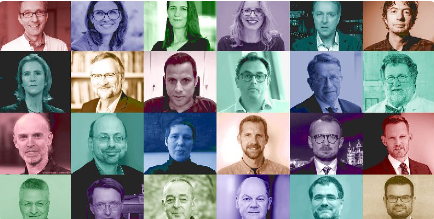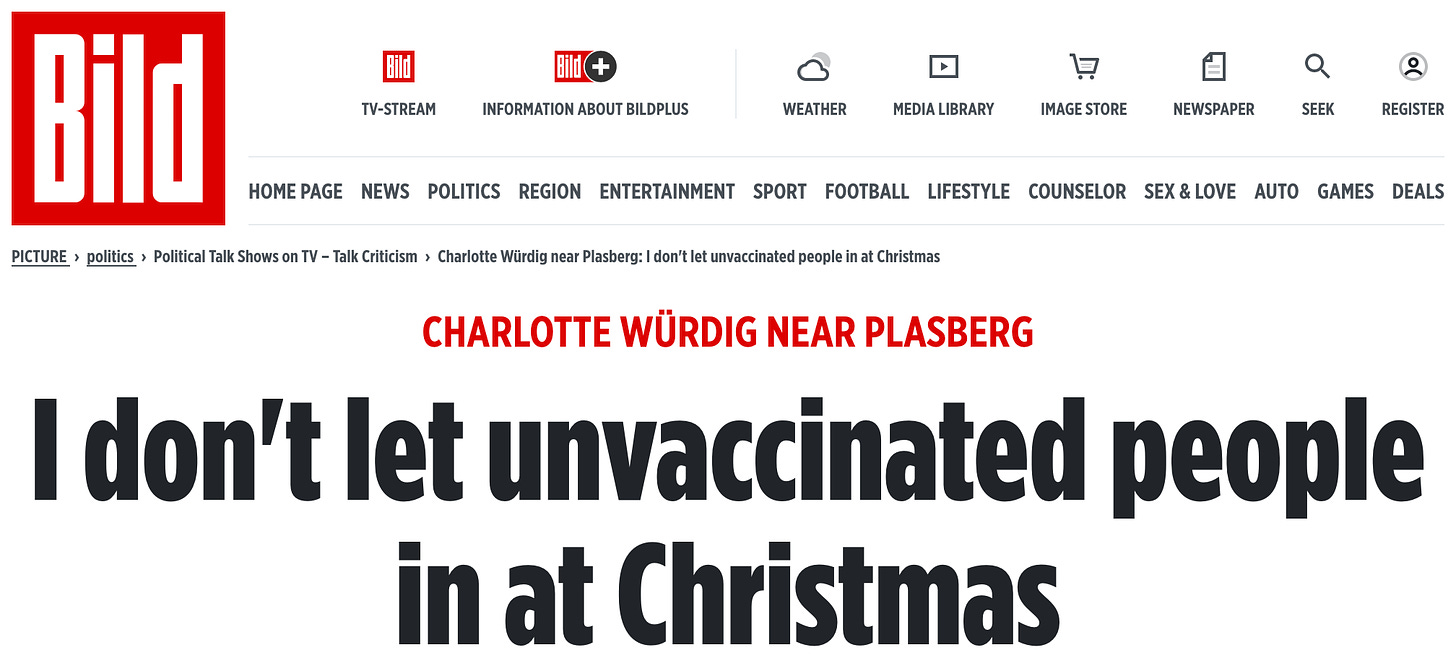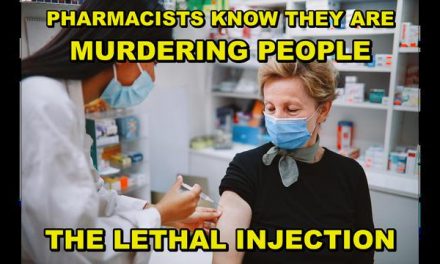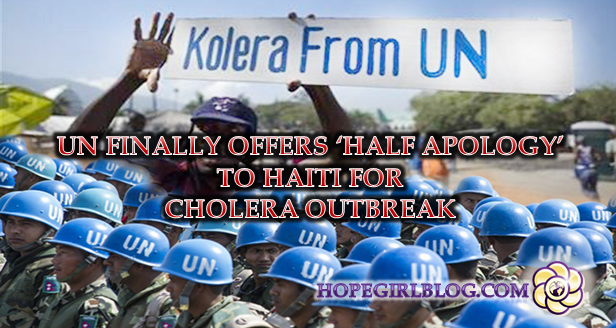In Germany, a new FOIA is out: A physician won against the German government. He received protocols of the Corona Expert Council. The group recommended tough measures like mandatory vaccinations.
A few days ago, on June 16, 2023, the physician Christian Haffner achieved a sensation: after a year-long legal battle with the German Federal Chancellery, he successfully obtained the protocols of the so-called “Corona Expert Council” on the basis of the Freedom of Information Act (FOIA). The panel had met from December 2021 to April 2023 under the condition of utmost confidentiality. It was composed of media-known protagonists of the German Corona era, such as WHO protege-virologist Christian Drosten. German Health Minister Karl Lauterbach and other government officials regularly attended the circle. What makes the material so explosive is the fact that the Corona expert council accompanied the internal opinion-forming process of the government coalition to its bill of a general vaccination obligation, which was finally rejected on 07 April 2022 by the German parliament. The released protocols show: The expert council had recommended the general vaccination obligation and the continuation of Corona measures in the fall of 2022 – although the panel was well aware that vaccination does not protect against transmission, the population had long been tired of measures and Omicron was on the rise. The explosive documents provide a chilling glimpse into the closed worldview of “experts” who are willing to put their scientific ideology above the well-being of citizens.
The protocolls of the Corona Expert Council and the accompanying letter from the Chancellor’s Office were made public and available for free download by Christian Haffner on wednesday, June 28, 2023. The protocolls were given to me for analysis with kind permission on Saturday, 06/17/2023. I would like to sincerely thank Christian Haffner for his trust and his persistent efforts to obtain a central document of German Corona policy, that will answer many open questions. This text is a shorter version of the German article.
It was a long and tough process. On July 30, 2022, the physician Christian Haffner applied for the protocols of the Corona Expert Council under the Freedom of Information Act (FOIA), as they appeared to him to be of high importance for the political opinion-forming process in the actual Scholz cabinet and the so-called traffic light coalition, consisting of Social Democrats (SPD), the Green Party (Die Grünen) and The liberal party (FDP). The coalition had let vote on the bill of a general vaccination obligation, which was rejected finally on 07 April 2022. Stunned as to how such an anti-democratic proposal could have occurred, and convinced that an answer might be found in the advisory activities of the Corona Expert Council – whose work was carefully kept under wraps – Haffner fought tenaciously for a year to have the documents released.
The FOIA request, which Haffner submitted on July 31, 2022, via the portal FragDenStaat, was rejected for the first time in September 2022. His lawyer filed an appeal – which was again rejected. At the beginning of January 2023, the case ended up in court, which ruled in favor of the plaintiff and demanded that the Federal Chancellery hand over the documents in accordance with the Freedom of Information Act. The Chancellor’s Office, in turn, delayed compliance with the court order through repeated requests.
On June 16, 2023, one year after his request, Haffner finally received the documents – with certain restrictions: The names of the originators of specific proposals in the transcripts were redacted throughout, with the exception of politicians and public officials. Each redaction is carefully justified in the 50-page cover letter. Mostly, it is about the personal safety of the panel’s participants, who would see themselves exposed to various hostilities from the so-called “Reichsbürger and Querdenker scene” in a politically tense situation. “Querdenker”, (eng. “cross-thinker”) was the common frame in Germany used by politicians and mainstream media to slur and silence oppositional voices during the German Corona regime. Although there does exist “Querdenken” as an organization, most people defamed with the term had no relations whatsoever with the organisation. As the Chancellor’s Office explains in detail in its legal cover letter, the confidentiality interests of those affected therefore outweigh the right to freedom of information because of an alleged risk by said “Querdenker”:
“The above-mentioned selective redactions relate in particular to the names of the members from whom individual contributions originate, information traceable to individual members, the sources of certain information to be protected (in particular if (interim) results from unpublished studies are concerned), the names of certain pharmaceutical companies/drugs if assessments of their efficacy have been made, and in individual cases certain suggestions if they can be attributed to participants and it is to be feared that the attribution could result in a danger to the person concerned.”
“The risk situation for top politicians, state organs and scientists is substantiated by the reporting already presented in the statement of defense. At least individual “corona measures” implemented or discussed by the federal government are still highly controversial today. The debate in this regard continues to be emotionally and politically highly charged, so that individual Corona topics continue to be classified as “excitement topics” with mobilization potential that cannot be reliably assessed. Here, political decision-makers or scientific advisors continue to be exposed to attacks from the Reichsbürger and Querdenken scene with regard to their involvement in the federal government’s corona policy. These are not only “verbal outbursts” on the Internet, but there is a considerable readiness to use violence in parts of this scene, which even requires constant personal protection for individual exposed persons. Granting access to information without blacking out the author of contributions to meetings would, with regard to assessments of Corona-relevant topics, endanger the physical integrity, freedom and life of the members and guests of the Corona Expert Council in such a concrete way that the plaintiff’s informational interests must take a back seat to this. (.) It is to be assumed that the Reich citizen and cross-thinker scene, by taking note of corresponding information, takes individual members, who may have pleaded for particularly drastic measures, as the target of their violence.”
“The described danger applies in particular to this procedure, which is accompanied by the platform fragdenstaat.de, which results in an immediate online placement of the issued documents and corresponding linkability and very broad accessibility.”
“Should there be any doubt about the assessment of a continuing danger situation for members or guests of the Corona Expert Council, it is requested that the court be informed. The defendant will then prove the danger situation by further reporting in the media and social networks.”
Although Christian Haffner had requested the record of all meetings of the Council of Experts, the document handed over to him contains only 25 of 33 meetings, up to and including July 12, 2022. Although the eight meetings not included were in the period after he submitted his request on July 31, 2022, the request clearly referred to all meetings. Haffner’s attorney has already followed up with the Chancellor’s Office in this regard.
The members
The members of the Council of Experts were 19 individuals selected by the federal government who had previously taken a fairly clear position on Corona. The majority of them had appeared on public talk shows. The Council of Experts consisted of 18 professors from various disciplines, one district administrator. The opening speaker and patron was Chancellor Olaf Scholz. Federal Minister of Health Karl Lauterbach, Federal Chancellery Minister Wolfgang Schmidt, a Bundeswehr General, Carsten Breuer, and other, rotating experts attended regularly . The meeting was chaired by Heyo K. Kroemer, Chairman of the Board of Berlin Charité, and the virologist Melanie Brinkmann of the Technical University of Braunschweig, who has become famous through TV appearances. Prominent members of the panel such include virologist Christian Drosten, whose PCR-test the WHO had recommended within an unrealistically short time span worldwide, as well as the “German Fauci” Lothar Wieler, the head of the German Institute of Infectious diseases RKI. Other prominent members include Alena Buyx, a Wellcome-Trust protegé, expert on “gene editing” and head of the “German Ethics Councils”, as well as Thomas Mertens, head of the STIKO, the German Vaccine Safety Commission. The lesser-known members of the panel include physicians, nudging experts, psychologists and infectiologists. Notably, there was not a single epidemiologist in the group.
The meetings of the Council of Experts took place regularly by video conference, with the exception of a face-to-face meeting on May 31, 2022, in the International Conference Room of the Federal Chancellery.
In the following, the key points of the individual meetings of the Expert Council will be summarized and critically commented on. Due to the complexity of the topic, no claim is made to completeness. The aim is to elicit how the recommendations of the Corona Expert Council impacted the political and social climate in Germany during the tough Corona measures winter of 2021/ 2022.
First session: December 14, 2021
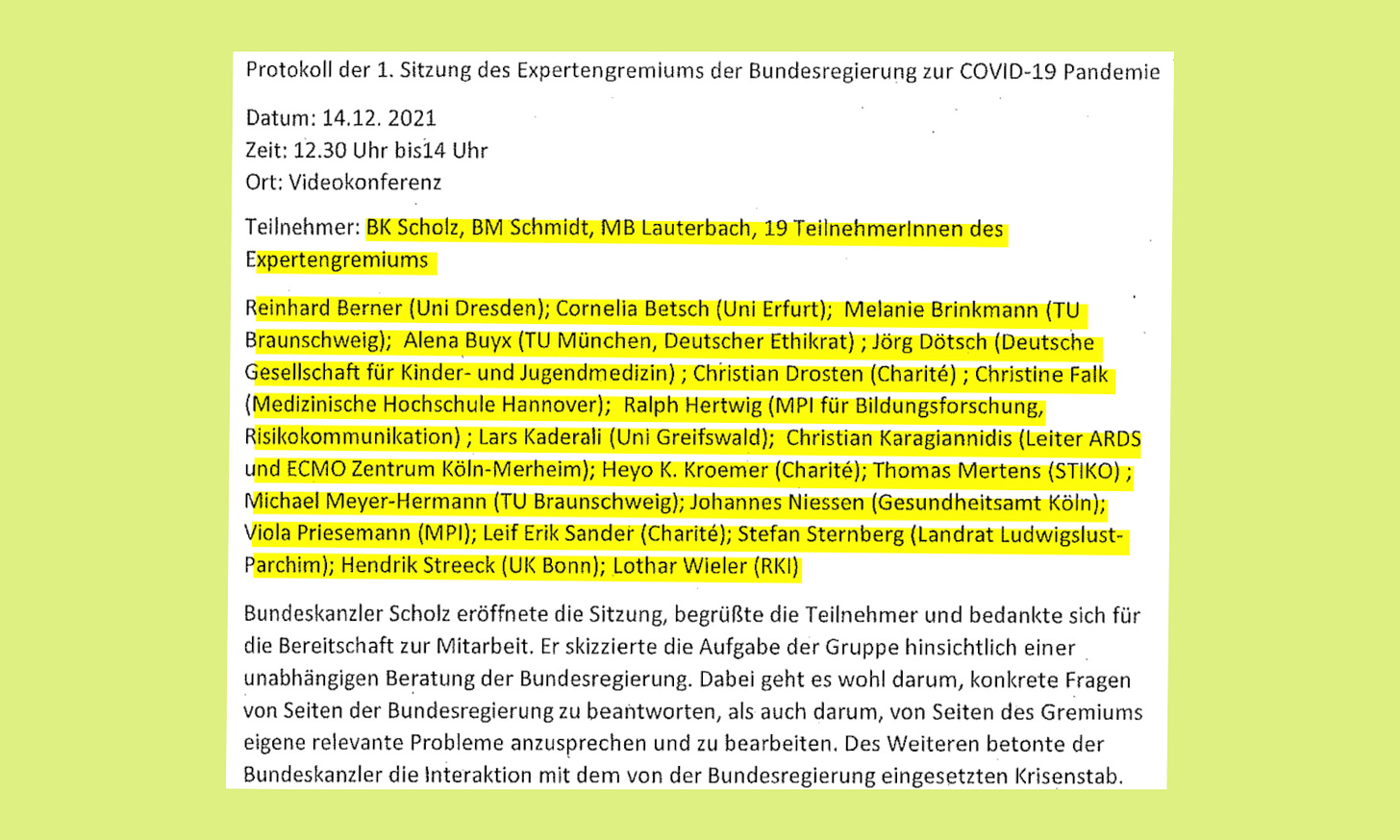
The first meeting was opened by Chancellor Olaf Scholz. He thanked the participants for their cooperation. He said the group should operate as an independent advisory body, integrated into a close technical exchange between the Expert Council, the Chancellor’s Office and the Crisis Staff. Federal Minister Karl Lauterbach and Federal Chancellery Minister Wolfgang Schmidt were present at the first meeting and promised their regular participation. Lauterbach emphasized the importance of scientific foundations for political decision-making, but stressed that it was the politicians who made the decisions. Strict confidentiality of the deliberations was agreed upon, as well as uniform communication to the outside world. For the next meeting, the participants were to gather expertise on the new omicron variant, which was scheduled three days later due to the assumed urgency.
Second session: December 17, 2021
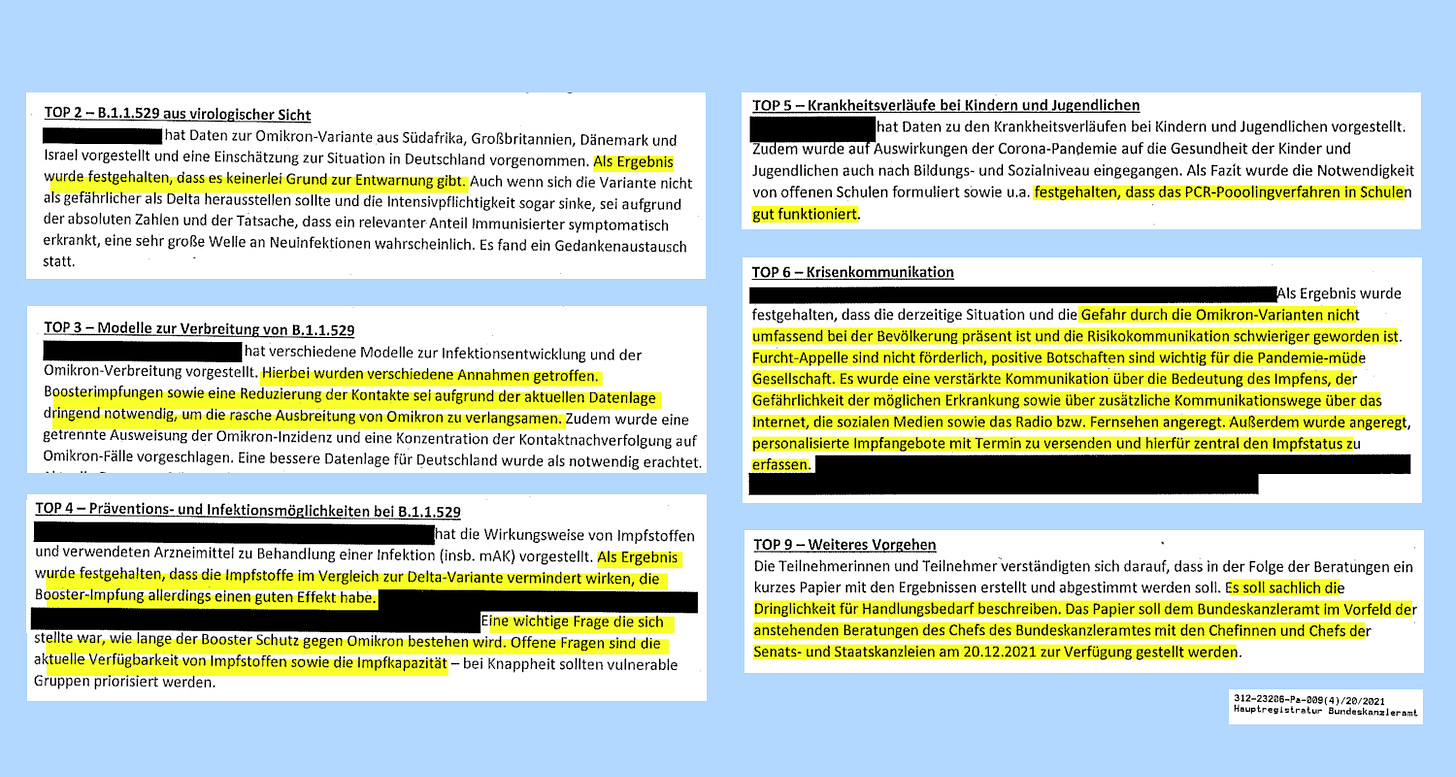
In the second session, it was pointed out that there was “no reason for relaxation” in light of Omicron. A modeler presented scenarios on the new variant and concluded Booster vaccinations and contact reduction were “urgently needed to slow the rapid spread”. With regard to children and adolescents, the experts noted that “PCR pooling tests” at schools would work well. No evidence base for this claim – such as how many infections testing in schools has effectively prevented – was provided.
The rest of the meeting focused on crisis communication. The experts complained that the public was not taking the Omicron variant seriously enough. Fear appeals would go nowhere, and risk communication had become more difficult. “Positive messages for the pandemic-weary society” were needed, via social media, on radio and on television. The importance of vaccination was again explicitly emphasized. Personalized vaccination invitations and centralized recording of vaccination status in the form of a vaccination registry were suggested.
In retrospect, the lines “positive messages for a pandemic-weary society” seem completely detached from the reality of life in the German winter of 2021: While the Council of Experts was considering new measures behind closed doors, the unvaccinated were excluded from every social life beyond supermarket, town hall and doctor visits via 2G – (vaccinated & covalescent only) and 3G rules (vaccinated, covalescent and tested only) and were defamed and bullied by the media on a daily basis. Are these the “positive messages” the Council of Experts was talking about? And if it really cared about “positive messages” – why didn’t it urge prudence in light of the poisoned social climate?
Third session: December 21, 2021
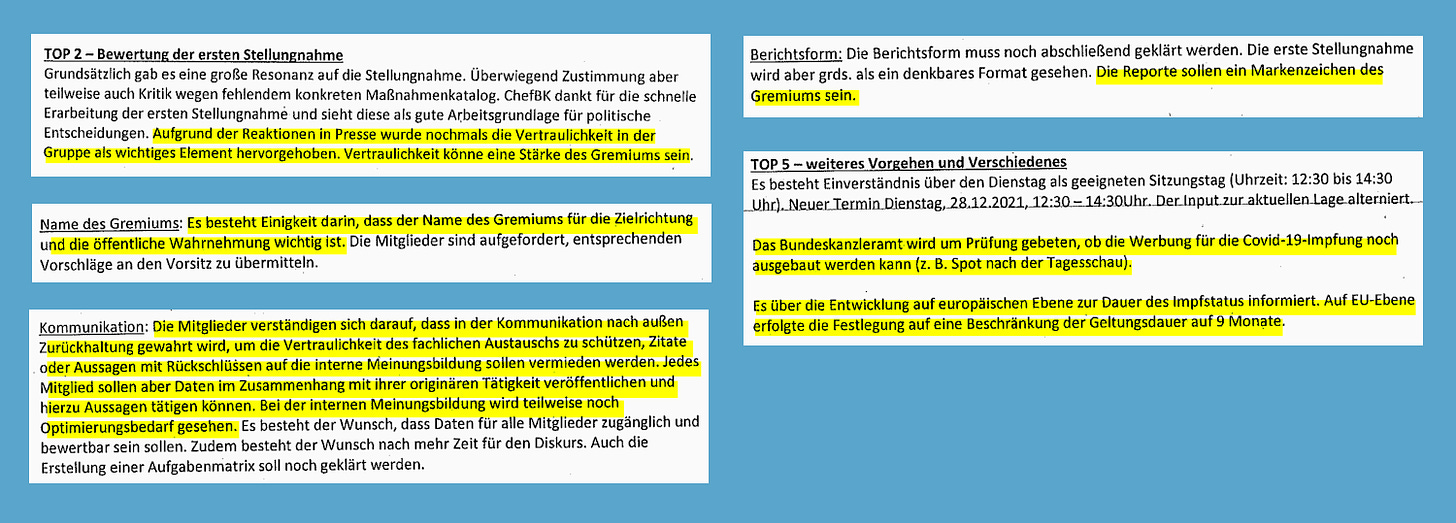
At the third meeting, “due to reactions in [the] press”, the confidentiality of the group was again appealed to as an “important element.”
“Confidentiality could be a strength of the body.”
In external communications, “restraint should be maintained” to protect the “confidentiality of professional exchanges.” Quotations or statements with inferences about the group’s internal formation of opinion should be avoided if possible, but each member was allowed to speak about information related to his or her own professional activities.
The Chancellor’s Office was specified as the “client.” It was also pointed out that an “appropriate name for the panel is important for its purpose and public perception.” Members were encouraged to submit name suggestions. It is significant with regard to the desired public perception of the body that the title “Expert Council” was chosen.
Apparently, there was a consensus among the experts that there would still not be enough publicity for vaccination in Germany in the winter of 2021. The group therefore requested an examination on the part of the Federal Chancellery as to whether advertising for the COVID-19 vaccination could not be expanded. For example, an advertising spot immediately following the daily news program would be conceivable.
Also duration of the convalescent status at the European level was addressed:
“It [was] informed about the development on [the] European level on the duration of the vaccination status. At the EU level, the determination was made to limit the duration to 9 months.”
The statement was made in the presence of RKI chief Lothar Wieler, whose RKI, equivalent to the CDC, had reduced the duration of convalescent status in Germany from six to three months just less than a month later, on Jan. 17, 2021, even though it was already three months below the European benchmark in Germany. Considering the fact that RKI head Lothar Wieler was well informed about the European guideline value of nine months, the German special path seems even more outlandish.
Fourth session: December 28, 2021
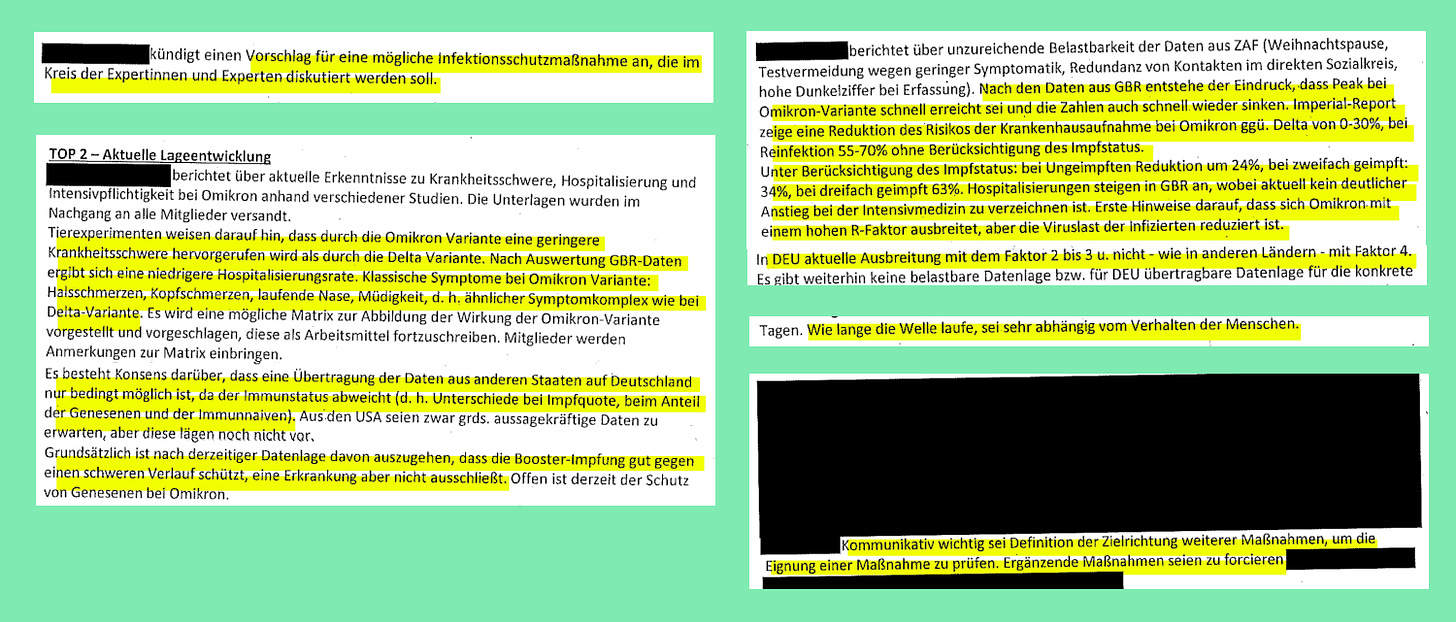
In the fourth session, the experts noted that Omicron produced lower disease severity than Delta. Hospitalization rates were lower, with hospital admissions peaking quickly and declining rapidly. Although Omicron spread with a high R-factor, the viral load of infected persons was reduced. However, a transfer of data from other countries to Germany would be only possible to a limited extent “because the immune status differs”. With unsubstantiated assumptions such as these, a national solo effort could be excellently justified.
It was also stated that “Booster vaccination provides good protection against a severe course of the disease, but does not rule it out,” which means that the expert council was well aware that vaccination does not protect against transmission.
Again a high load of the hospitals is to be expected, by quarantine-conditioned personnel losses and a reduced bed capacity. It remains unclear why the experts apparently did not include indications that Omicron was less dangerous in their forecasts at all.
How long the current wave would run was “very dependent on people’s behavior.” The paradigm prevailing in the expert council is hereby made clear: humans are the problem.
Fifth session: 04 January 2022
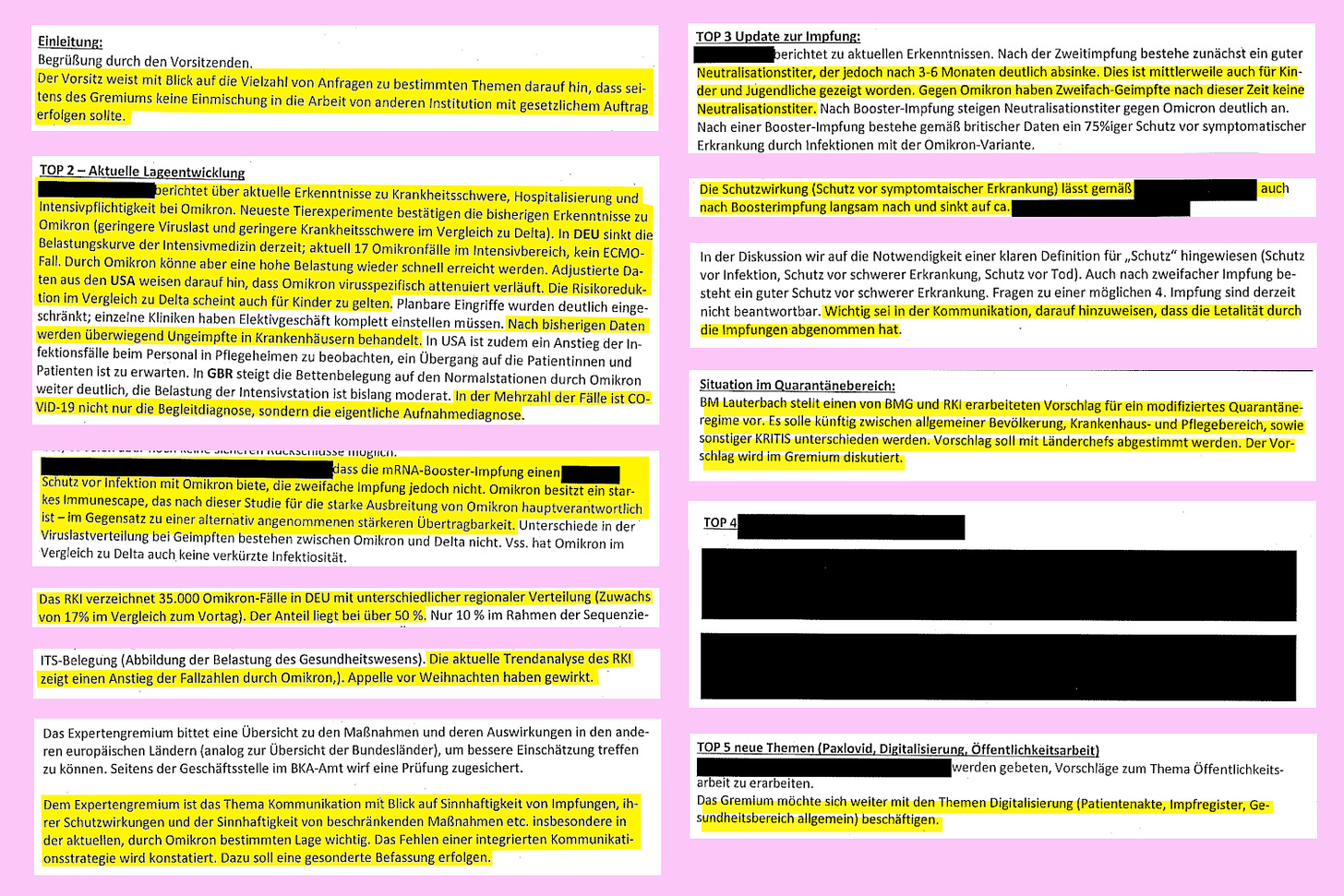
Immediately in the introduction to the third session, the Chair admonished that
“on the part of the Board there should be no interference in the work of other institution[s] with a statutory mandate.”
The question arises as to why such a warning was necessary in the first place – and which “other institution with a statutory mandate” the Expert Coucil had apparently interfered with.
A seemingly innocuous sentence in the protocol reveals an ethical abyss:
“The appeals before Christmas have worked”.
The term ‘appeal’ here is clearly to be understood as a trivialization of the political situation in Germany at Christmas 2021: Unvaccinated people were subject to the strictest contact restrictions. Public media and fact-checker flagships gave tips on how to deal with unvaccinated relatives at Christmas: one should demand a test from them, or, even better, invite them out altogether. Public figures stooped to statements such as
“I don’t let unvaccinated people in at Christmas.”
All the countless defamations and violations of fundamental rights divided families – the personal fates merely led to the cynical summary in the Council of Experts: “The appeals before Christmas have worked”.
The Council of Experts asked the Chancellor’s Office for an overview of measures taken by other European countries “in order to be able to make better assessments.” It is remarkable that the much more relaxed approach of other countries was noted, but not followed to any extent by the German “experts”.
With regard to Omicron, communication of the “meaningfulness” of vaccinations and measures restricting freedom” would be particularly important. The experts criticized the “lack of an integrated communication strategy”. It was “very important to point out that the lethality due to vaccinations has decreased.”
At the end of the session, it was agreed that “digital patient files” and “vaccination registers” should be dealt with further.
Sixth session: January 12, 2022
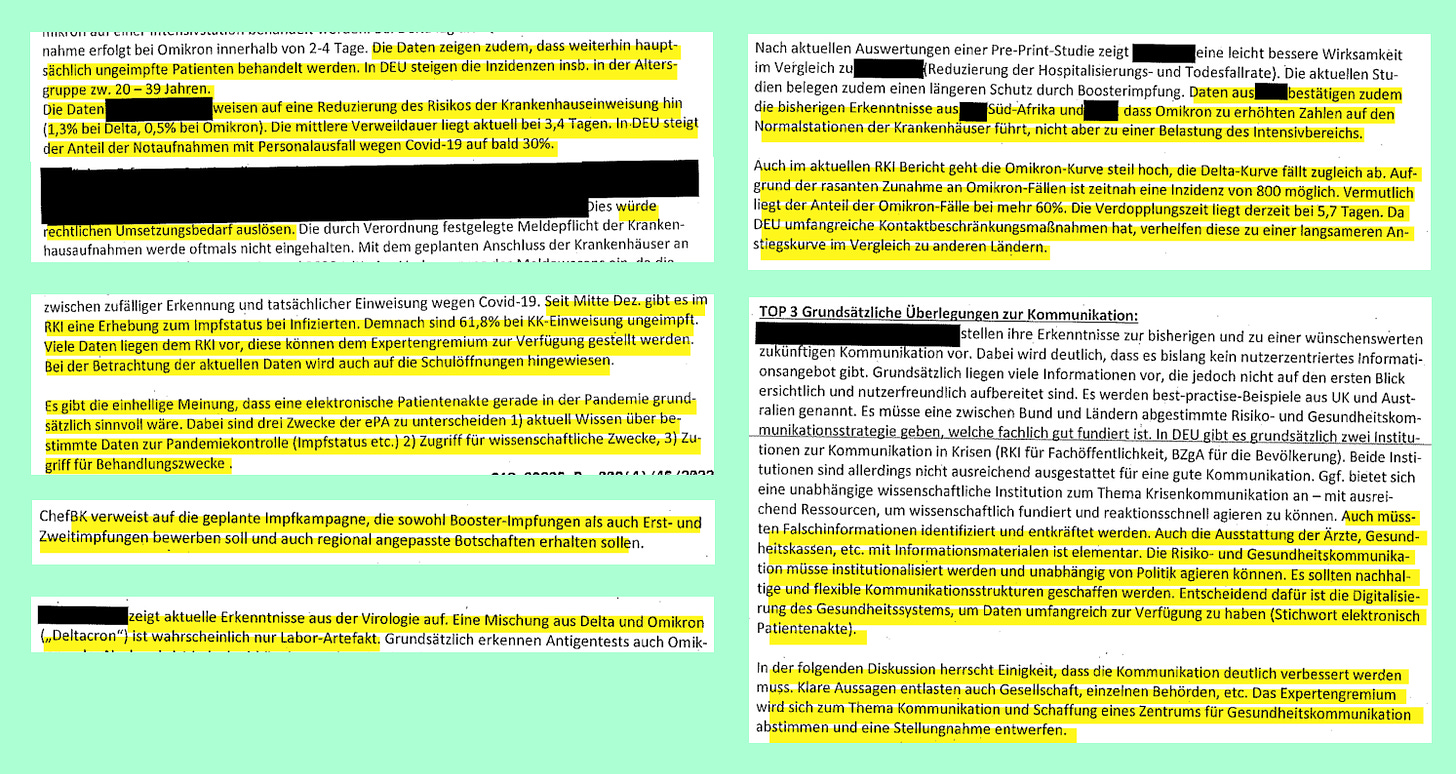
In the sixth session, evidence was stated that Omicron leads to increased numbers in normal wards, but not in intensive care. The proportion of Omicron in Germany was already at 60 %. The “experts” were sure: Due to “extensive contact restriction measures” Germany would have a “slower increase curve compared to other countries”.
“Misinformation” would have to be “identified and debunked”. The experts agreed that “communication” would still need to be significantly improved. “Clear statements” were demanded from politicians; the latter would “relieve the burden on society and politics.” A center for health communication was also considered.
A small reality check: There was truly no shortage of “clear statements” in Germany in the winter of 2021: Many celebrities and politicians called for the segregation of unvaccinated people from society. The verbal aberrations reached a level of insanity, that even a protest hashtag on Social Media was inspired: #Wirhabenmitgemacht or #Ichhabemitgemacht (“We participated / I participated”).
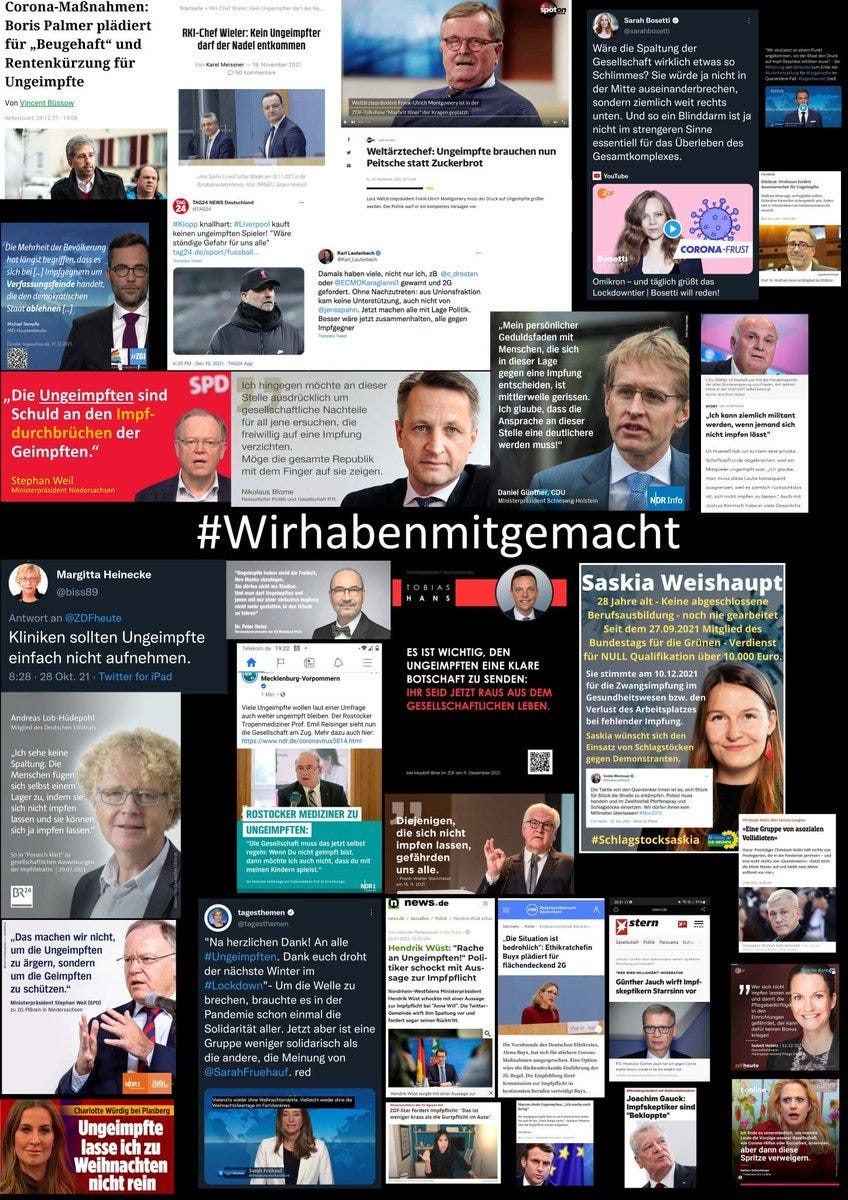
Seventh session: January 18, 2022
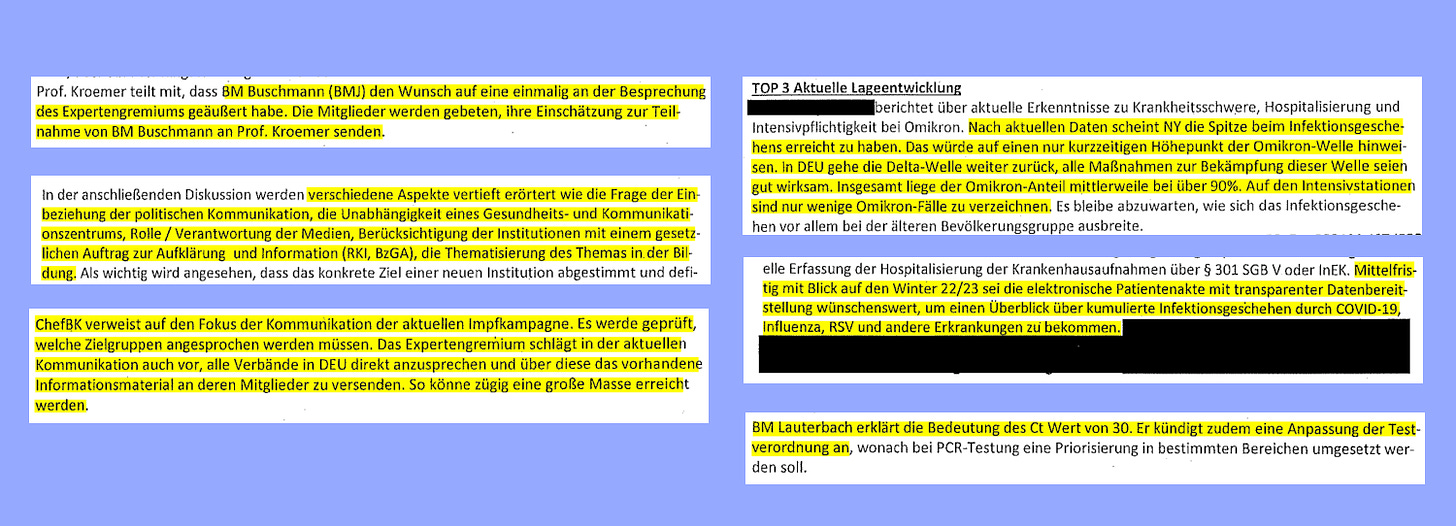
In the seventh session, the discussion focused, among other things, on the “responsibility of the media”. Chancellery minister Wolfgang Schmidt reported that it was being examined which target groups still needed to be specifically addressed. All associations in Germany should be encouraged to send information material to their members:
“In this way, a large mass could be reached quickly.”
In contradiction, in the same report on the development of the situation, it was stated that New York had apparently already passed the peak of the infection, which indicated “only a short-lived peak of the Omicron wave”. Also in Germany, the Delta wave would continue to decline, as “all measures to combat this wave (.) are well effective”. The proportion of Omicron would be over 90%, with only a few intensive cases.
The contradictions in this paragraph alone are overwhelming: The decline of the Delta wave was attributed to the effectiveness of the measures – which then, strangely enough, did not work against Omicron, which now accounted for over 90% of cases. That it is absurd to attribute a natural displacement of Delta by Omicron to the effectiveness of the measures should be obvious even without expertise in virology.
Eighth session: January 25, 2022
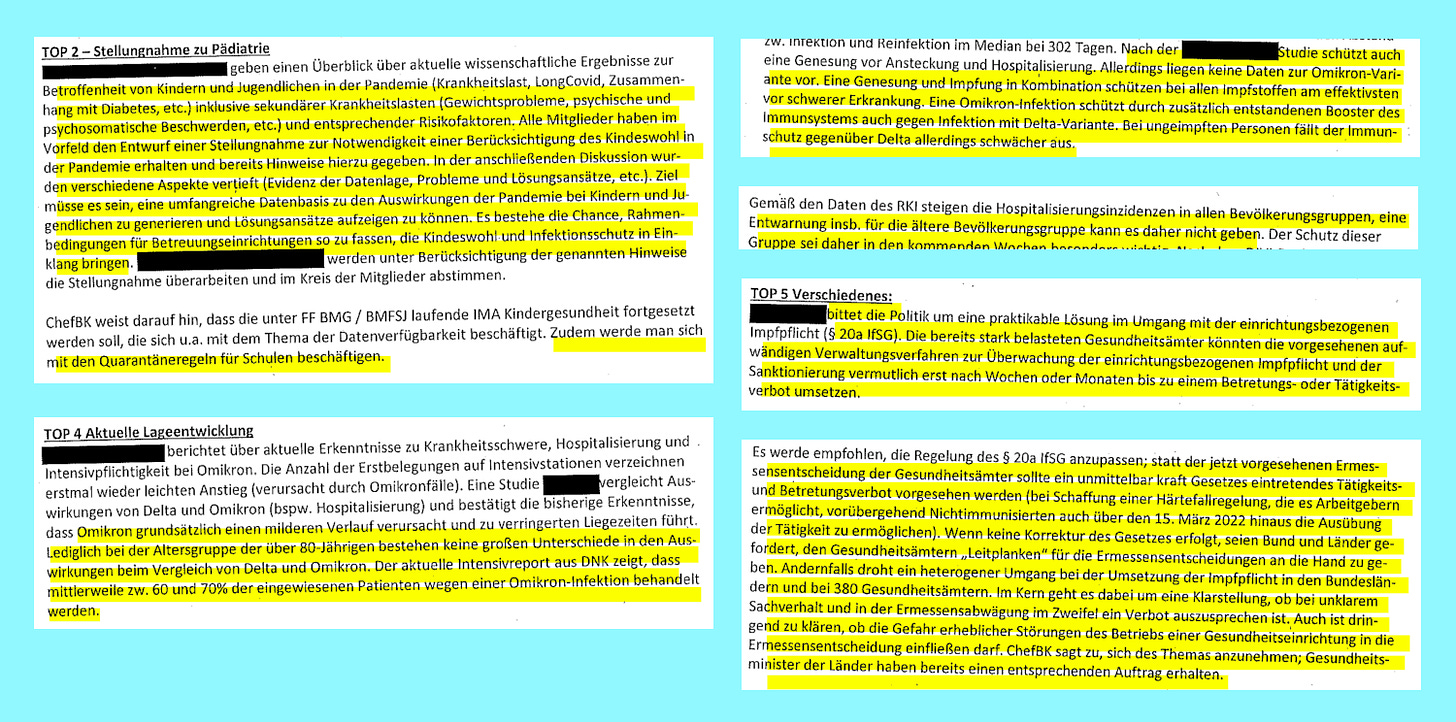
In the eighth session, the focus was on “Children and Adolescents.” In a “Statement on Pediatrics”, the
“affectedness of children and adolescents in the pandemic (disease burden, LongCovid, association with diabetes, etc.) including secondary disease burdens (weight problems, psychological and psychosomatic complaints, etc.) and corresponding risk factors”
was elicited. It was necessary to “maintain child well-being in the pandemic” It was stated, child welfare and infection control could very well be reconciled. In retrospect, words like these must seem like sheer mockery to parents in Germany: While the Council of Experts met and exchanged fine words about the best interests of the child, their children were forced under masks for up to eight-nine hours a day – in some schools even into midsummer, although the measures had long since been officially lifted. At least psychological and social consequences for children – somewhat euphemistically referred to as “secondary disease burdens” – were even mentioned once in the committee. However, the Council of Experts did not draw any consequences for political recommendations from this.
It was stated that Omicron generally caused a milder course and led to reduced hospital stays. Moreover, having passed through an omicron infection also protected against Delta:
“An Omicron infection also protects against infection with Delta variant due to additional boosters of the immune system that have developed.”
At the latest from this realization, any government interference in private vaccination decisions should have been history. Immediately, a relativization was put behind:
“In unvaccinated individuals, however, immune protection against Delta is lower.”
Who cares? A decision on compulsory vaccination should never have been made on this basis. Yet, in Germany, a compulsory vaccination was already in place for all healthcare workers, policemen, soldiers and fire workers. At the same meeting, an expert asked policymakers for a “workable solution in dealing with facility-based mandatory vaccination (Section 20a IfSG).” He lamented:
“The already heavily burdened public health departments could probably only implement the envisaged elaborate administrative procedures for monitoring the facility-based vaccination obligation and sanctioning after weeks or months until an entry or activity ban. It is recommended that the provision of Section 20a ffSG be amended; instead of the discretionary decision of the health authorities now provided for, a ban on activity and entry should be provided for that comes into effect immediately by operation of law (with the creation of a hardship provision (.).” [Minister of Chancellery Wolfgang Schmidt] promises to address the issue; health ministers of the states have already received a corresponding order.”
It is already nearly a master achievement to accommodate so many anti-democratic advances in a single text block. The “expert” affirmed a violation of the fundamental rights of members of the nursing sector, the basic right to physical integrity, dignity and free exercise of profession. Moreover, he recommended nothing less than the undermining of federalism by demanding a uniform federal regulation by law, for something that was previously at the discretion of the health departments of the states. He should have foreseen that with the new hardship rule, de facto everything would remain the same, and only a bureaucratic additional effort for clinics and employees would be added: In order to be able to keep unvaccinated employees and avoid bottlenecks, clinics would predictably have to resort to the hardship rule. The virus, on the other hand, is unlikely to have cared much about such a hardship case of German bureaucratic fetish.
Ninth session: February 01, 2022
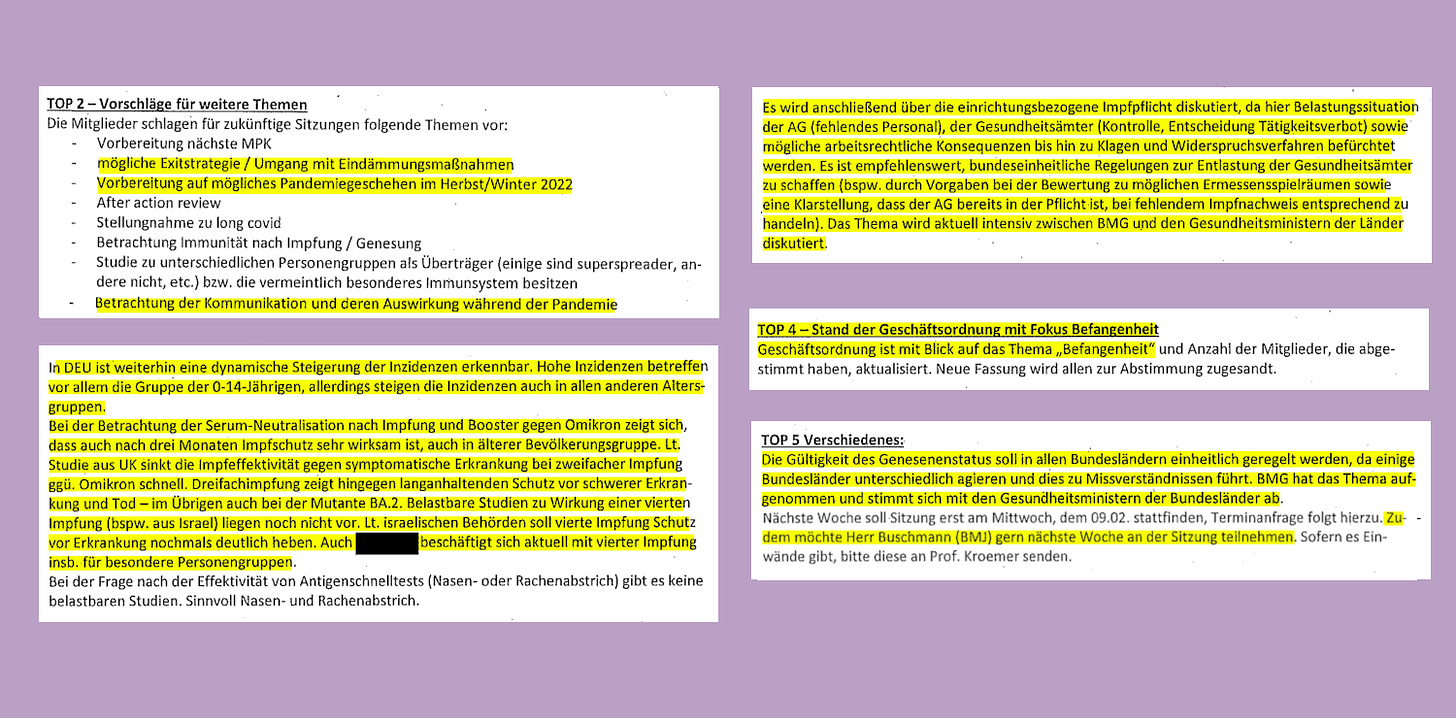
The ninth session discussed how an “exit strategy” might look like and how to deal with “containment strategies.” Translated: How to get out of a failed containment policy in a face-saving way. “Communication and its impact during the pandemic” was also put on the agenda again.
The importance of the Booster, even the double Booster versus double vaccination, was once again emphasized:
“Reliable studies on the effect of a fourth vaccination (e.g., from Israel) are not yet available, but according to Israeli authorities, [the] fourth vaccination [should] again significantly raise protection against disease. Also [–] is currently dealing with fourth vaccination (.) for special groups of people.”
Apparently, statements by Israeli authorities were sufficient for now for the experts to even consider the fourth vaccination.
The discussion then turned to facility-based mandatory vaccination. Lack of staff, he said, leads to high burdens on clinics, as well as health departments, due to labor-intensive control of activity bans. In addition, “consequences under labor law in the form of lawsuits and appeal proceedings” were feared. Therefore, it was “recommendable to create uniform federal regulations to relieve the health offices.” The topic would already be discussed intensively between the Federal Ministry of Health and the health ministers of the states.
It was announced that Justice Minister Marco Buschmann would be happy to attend the next meeting.
Tenth session: February 09, 2022, with justice minister Marco Buschmann – on the subject of compulsory vaccination
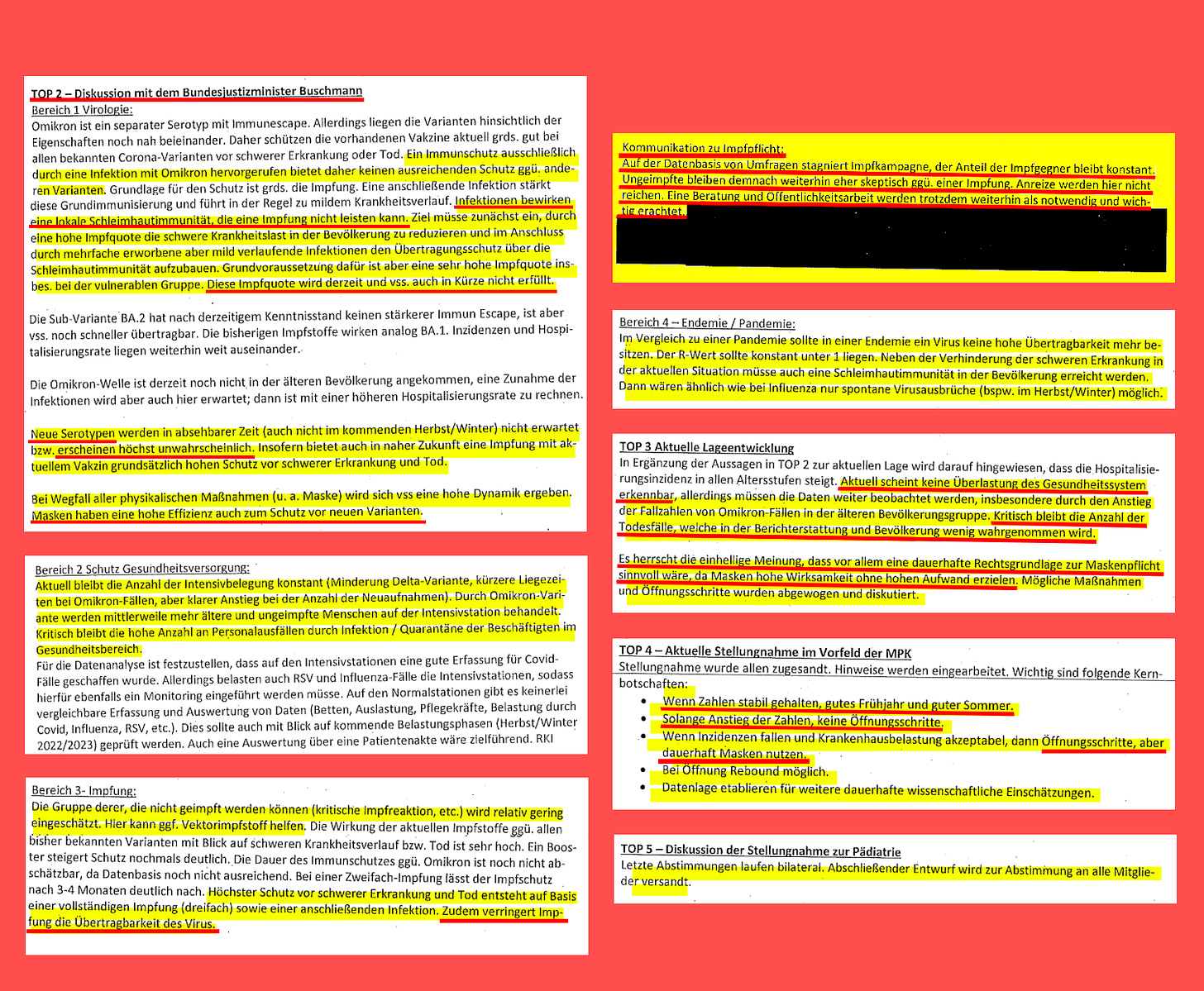
The tenth session on 09 February 2022, with Justice Minister Marco Buschmann in attendance, is the central session with regard to the bill on the General Immunization Requirement, which was submitted for a vote on April 07, 2022. The protocols are riddled with contradictions: for example, it was stated that although Omicron is a “separate serotype,” fortunately the variants are still so close in terms of characteristics that “existing vaccines currently provide basically good protection against severe disease or death in all known Corona variants.” An infection caused by Omicron would “therefore” not offer sufficient protection against other variants.
What a deduction: because the vaccines worked so well, Omicron did not cause cross-immunity in older variants such as Alpha and Delta. But at the same time, Omicron and the older variants are still so close to each other that the vaccination works excellently with both Omicron AND Delta. The fact that Omicron generates cross-immunity to other variants was flatly denied in the presence of the Minister of Justice, Marco Buschmann, although the expert council had itself determined this two weeks earlier. The protocol went on to say:
“Infections cause local mucosal immunity, which vaccination cannot provide.”
Correct – and at the latest at this point any discussion about a vaccination obligation should have ended. Why vaccinations are nevertheless necessary, however, was justified quite adventurously in the following:
“The goal must be to reduce the severe disease burden in the population through a high vaccination rate and subsequently to build up transmission protection via mucosal immunity through multiple acquired but mild infections. However, the basic prerequisite for this is a very high vaccination rate, especially among the vulnerable group. This vaccination rate is currently not being met and is not expected to be met in the near future.”
“With the elimination of all physical measures (including masks), there is likely to be a high dynamic. Masks have a high efficiency also to protect against new variants.”
The high number of staff absences due to infection or quarantine in the healthcare sector remained critical, it was stated. It is important to highlight here that “infections” here means “positive tests,” as all healthcare workers were tested daily and sent home immediately if they tested positive – regardless of whether anyone showed any symptoms of illness at all. Thus, the high staffing shortages due to health care quarantines, which were criticized here, were 100% self-fabricated by policies.
What follows is the central section of the document: the discussion on vaccination and compulsory vaccination, in the presence of Federal Minister of Justice Marco Buschmann.
The group of those who could not be vaccinated due to vaccination reactions was estimated by the experts to be “relatively small” – here, vector vaccines could help. The experts were convinced:
“The highest protection against severe disease and death occurs on the basis of complete vaccination (triple) and subsequent infection.”
In previous meetings, however, the experts had already noted that with Omicron, there was little severe illness or death, intensive care units were emptying, and Omicron already accounted for 90 % of variants in Germany. “Prevention against severe disease and death” was no longer a viable argument when mortality rates went down all by themselves with Omicron. But the protocols did not only contain inconsistencies on the topic, but also blatant falsehoods:
“In addition, vaccination reduces the transmissibility of the virus.”
This statement is demonstrably scientific disinformation, that had already been disproven at that point in time. The fact that, in the context of the debate on compulsory vaccination, this false claim was once again presented to the Minister of Justice as a “scientific fact” is outright scandalous.
The experts now gave their assessment of compulsory vaccination:
“Communication on compulsory vaccination:
On the data basis of surveys vaccination campaign stagnates, the proportion of opponents of vaccination remains constant. Unvaccinated, accordingly, remain rather skeptical about vaccination. Incentives will not be enough here. Counseling and outreach are nevertheless still considered necessary and important.”
The second part of the following statement is blacked out in the protocol. The central sentence in this section is “Incentives will not be enough here.” What is to be insinuated is clear: There is no way around mandatory vaccination. It is true that the experts were aware that the population’s willingness to vaccinate had already been exhausted – but instead of respecting the citizens’ free decision, it is implied here that compulsion would then be necessary. At least they were still willing to graciously provide “counseling and outreach” to the unwary.
Also in the session, the difference between a pandemic and an endemic was explained:
“Compared to a pandemic, in an endemic a virus should no longer have high transmissibility. The R-value should be constantly below 1. In addition to preventing severe disease in the current situation, mucosal immunity should also be achieved in the population, he said. Then, similar to influenza, only spontaneous virus outbreaks (e.g., in autumn/ winter) would be possible.”
However, the R-value in Germany was already below 1 in march 2020 – and Corona showed a seasonal pattern from the beginning, just like influenza. If one follows the experts’ reasoning, Corona was already endemic right from the beginning – completely without vaccination.
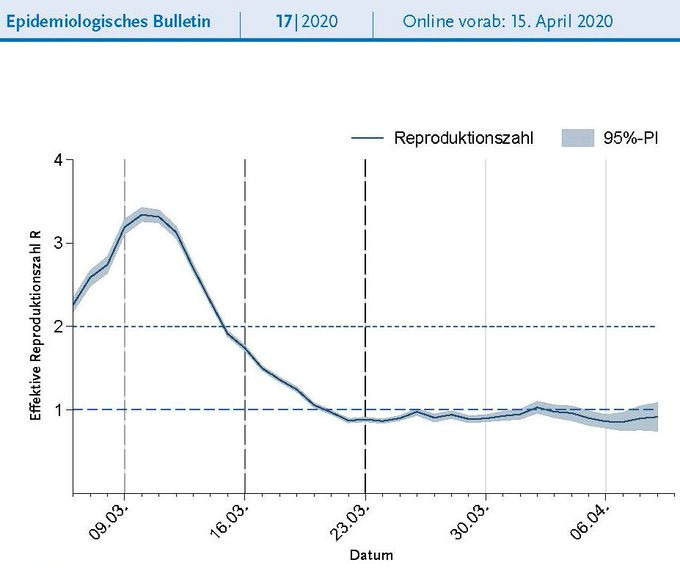
With regard to the current situation in the healthcare system, it was stated:
“Currently, there does not appear to be an overload of the health care system, however, the data must continue to be monitored, especially with the increase in Omicron cases in the elderly population. Critically, the number of deaths remains low in reporting and population awareness.”
More loss of realism than these lines express is probably hard to imagine: In the German winter of 2021, the population was bombarded 24/ 7 with Corona death figures on virtually all media channels. And although at the time of the tenth meeting it was deepest winter – peak of the cold season – “currently (.) no overload of the health system was recognizable”. On this basis, mandatory vaccinations should never have been voted on – but it was even declared necessary in the same meeting, because “incentives will not be enough here”. One can hardly more ignore the physical self-determination of humans.
A continuation of the mask requirement was also considered:
“There was also an unanimous opinion that a permanent legal basis for mandatory masks would make sense, since masks achieve high effectiveness without high expense. Possible measures and opening steps were weighed and discussed.”
The well-known international Cochrane study, however, has not been able to prove any significant effectiveness of masks. Before 2020, textbooks and WHO had always advised against the use of masks in everyday life.
In preparation for the upcoming Minister Presidents’ Conference, concrete recommendations for action were presented by the experts:
- If numbers held stable, good spring and summer
- As long as numbers rise, no opening steps
- If incidences fall and hospital load acceptable, then opening steps, but use masks permanently
- If opening, rebound possible
- Establish data base for further permanent scientific assessments
Aside from the imposition of infantilizing language that seems bizarre in light of basic rights restrictions for 84 million German citizens, there is now a widespread recognition that Corona is a classic cold virus that behaves seasonally like all cold viruses. This also means that numbers in the winter have no bearing on numbers in the summer because the virus is constantly alternating. No one knows which cold virus will dominate next winter and in what severity. Trying to derive summer figures from artificial winter figures produced by mass testing, must be clearly named for what it is: pseudoscience.
Moreover, the expert council submitted concrete political instructions for action to the prime ministers here, instead of simply presenting the scientific data, on the basis of which the ministers could then have made political decisions. Since the recommendations were based on false assumptions, Olaf Scholz government’s Corona policy was demonstrably determined by pseudoscience.
At the end of the meeting, the situation of children and young people was briefly discussed. However, the experts apparently saw no urgent need for action: The members were first presented with a voting report for their consideration – there was no rush. The daily burden placed on children by masks and tests in everyday school life was apparently perfectly compatible with the “best interests of the child”.
Eleventh session: February 15, 2022
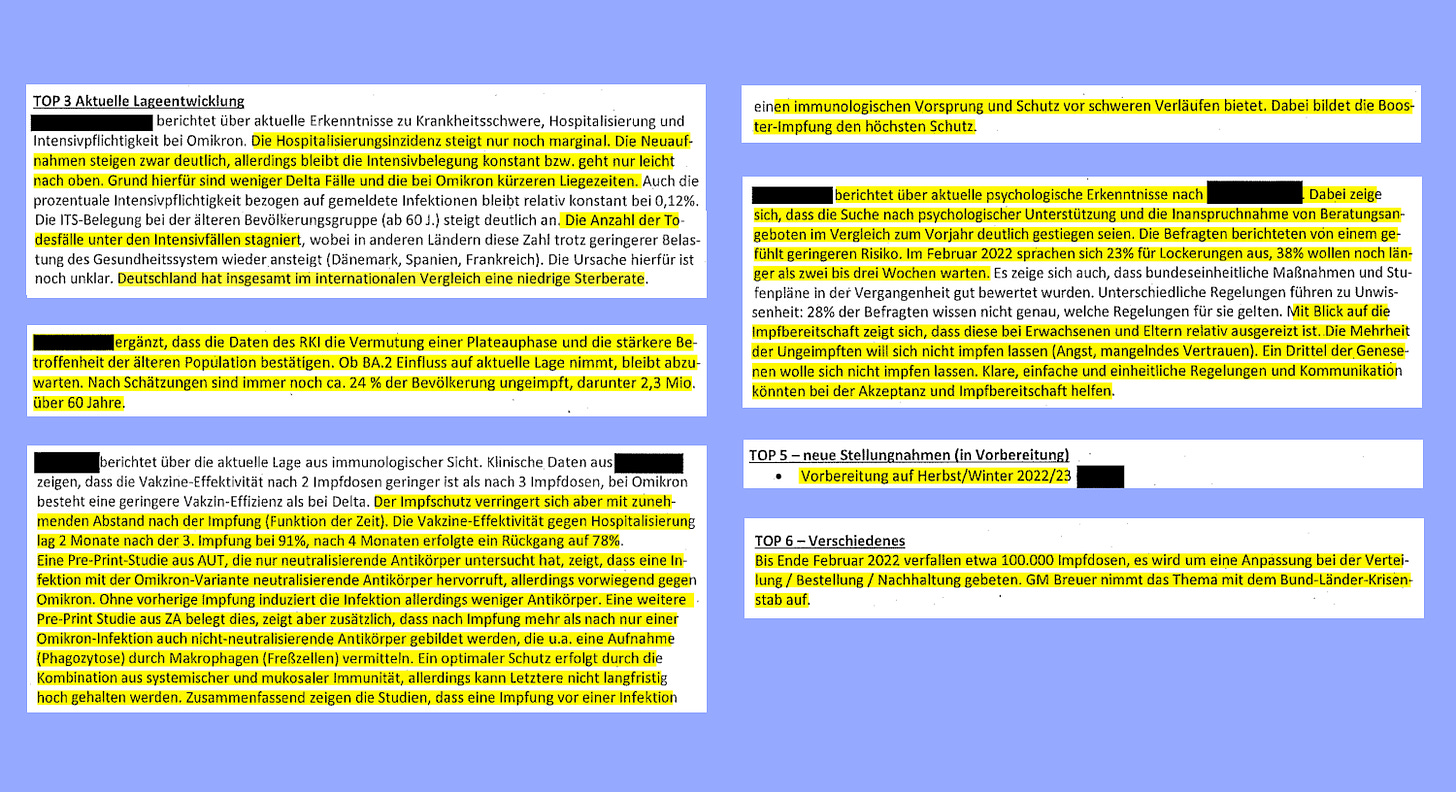
At the eleventh meeting, it was noted that hospitalization incidence was only marginally increasing. Although new admissions were increasing, ICU occupancy remained virtually constant, due to shorter lengths of stay at Omicron. The number of deaths in intensive care units was stagnating. Overall, Germany had a comparatively low mortality rate. One expert reported a study that suggested lower vaccination efficacy with Omicron. A rapid decline in vaccination protection was also noted: Four months after vaccination, it would be only 78%.
In the following,“psychological consequences in the population” were discussed. The search for psychological support and the use of counseling services would have increased significantly compared to the previous year. At the same time, respondents would have a lower perception of risk in regard to Corona. The willingness to vaccinate among “adults and parents” was largely exhausted. The fact that “parents” – who are apparently also adults – were named separately here was probably intended to indicate the potential for child vaccination that might still exist in the population. The majority of the unvaccinated would not vaccinate due to fear and lack of confidence.
“Clear, simple, and uniform rules and communication could help with acceptance and vaccination readiness.”
The question arises as to what “clear, simple and uniform rules” would have been used to increase the German measures winter at that time. The experts knew that the population’s willingness to be vaccinated had already been exhausted, and those who did not want to be vaccinated were based on fear and lack of confidence. However, people’s feelings, their dignity and their fundamental right to bodily self-determination did not seem to matter to the experts.
At the end of the meeting, a small reminder was given that about 100,000 vaccine doses would expire by the end of February 2022.
Twelfth session: February 22, 2022
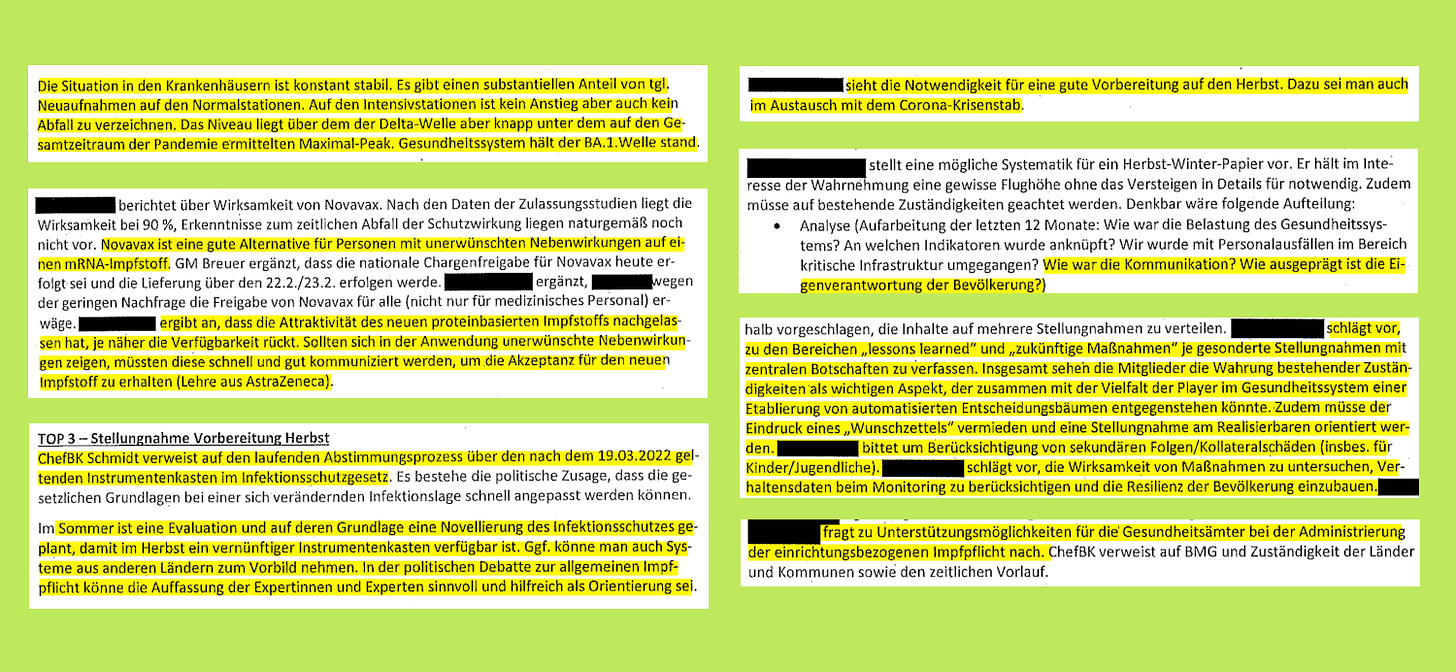
In the twelfth session, it was stated that the situation in hospitals was stable, and the health system was withstanding the Omicron wave.
An expert reported the latest figures on Novavax: efficacy was 90%. Novavax was “a good alternative for people with adverse reactions to an mRNA vaccine.” Implicitly, this suggested that even vaccine-injured persons could safely be vaccinated again – with Novavax. Admittedly, it was a daring idea to recommend to people who have already been vaccine injured another, poorly researched medication with unexplored interactions to the first one.
Carsten Breuer, the major General participating at the meeting, reported that the national batch release for Novavax occurred the same day. Another participant added, however, the demand for it was low. To increase confidence, any side effects would have to be well communicated this time, he said:
“If any undesirable side effects are seen in use, they would need to be communicated quickly and well to maintain acceptance for the new vaccine (lesson from AstraZeneca).”
Also discussed was “preparation for the fall.” All agreed that an “instrument box in the Infection Protection Act” had to remain in place beyond March 19, 2022. Federal Chancellery Minister Wolfgang Schmidt referred to an ongoing coordination process. A systematic approach was presented for the envisaged fall measures. The “impression of a wish list must be avoided”.
13th session: March 02, 2022
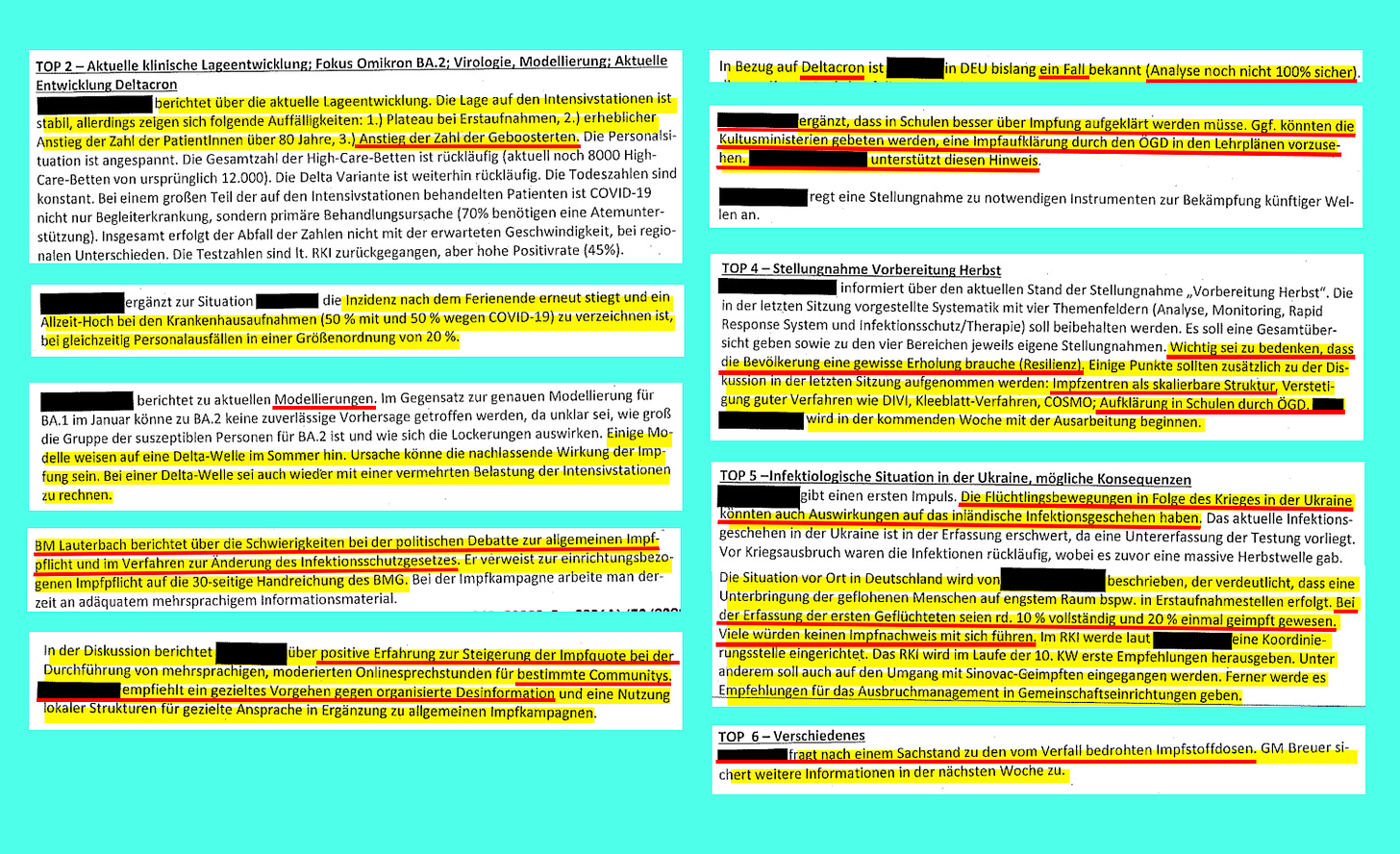
The 13th session was attended by Health Minister Karl Lauterbach, who reported on “difficulties”:
“BM Lauterbach reports on the difficulties in the political debate on general compulsory vaccination and in the procedure for amending the Infection Protection Act. (.) In the hospitals an increase of boostered patients is to be registered.”
The protocols do not specify what exactly the “difficulties in the political debate on general compulsory vaccination” were. The notion of “more boostered patients in clinics” was not further discussed.
One expert reported on new modeling. Some models pointed to a “Delta wave in the summer.” Honorable mention is made of “multilingual, moderated online consultations for specific communities (.) to increase vaccination rates.” One expert recommends “a targeted approach to organized disinformation.” Another calls for vaccination education to be part of school curricula:
“(.) better education about vaccination should be provided in schools. If necessary, the ministries of education could be asked to include vaccination education by the ÖGD in the curricula. [—] supports this advice.”
In the section for preparing fall measures, a disturbing sentence follows:
“It is important to remember that the population needs some recovery.”
Oscillating between coercion and relaxations, by the way, is a popular method of torture in prisons like Guantánamo, since all coercion wears off eventually, and the harshness of the coercion is not really felt again until there have been relaxations in between. Such a sentence, which calculatingly plays with giving people a certain recovery with “relaxations” first, only to maltreat them with coercion again, is a method from the darkest torture prisons of this world.
It was recommended that vaccination centers should be made permanent as a “scalable structure”. Also, the “Infectious situation in Ukraine” was addressed:
“Refugee movements as a result of the war in Ukraine could also have an impact on domestic infectious events.”
A sentence like this simply leaves one speechless, given the cynical reduction of war refugees to an alleged role as disease vectors. But the experts seemed to have a real headache with this question:
“While infections in Ukraine had recently been declining before the outbreak of war, he said that when the first refugees were recorded, about 10% had been fully vaccinated and 20% had been vaccinated once. Many would not carry proof of vaccination.”
The collective horror in the “Expert Council” is not hard to imagine: No proof of vaccination! Less than 20% vaccinated! With the arrival of the first Ukrainian refugees in Germany, measure hardliners like the ladies and gentlemen of the Expert Council were faced with a moral and ethical dilemma: On one hand, it was necessary to be as humanitarian and selfless as possible – on the other, a vaccination rate of 20% was bound to trigger gasps from the discourse that preceded it in the Council of Experts. It was not appropriate to immediately impose vaccination requirements on traumatized people who have just fled the war, but it was still necessary to be tough on the local population, since a general vaccination requirement was envisaged. At the same time, the impression of unequal treatment between locals and refugees had to be avoided.
14th session: March 15, 2023
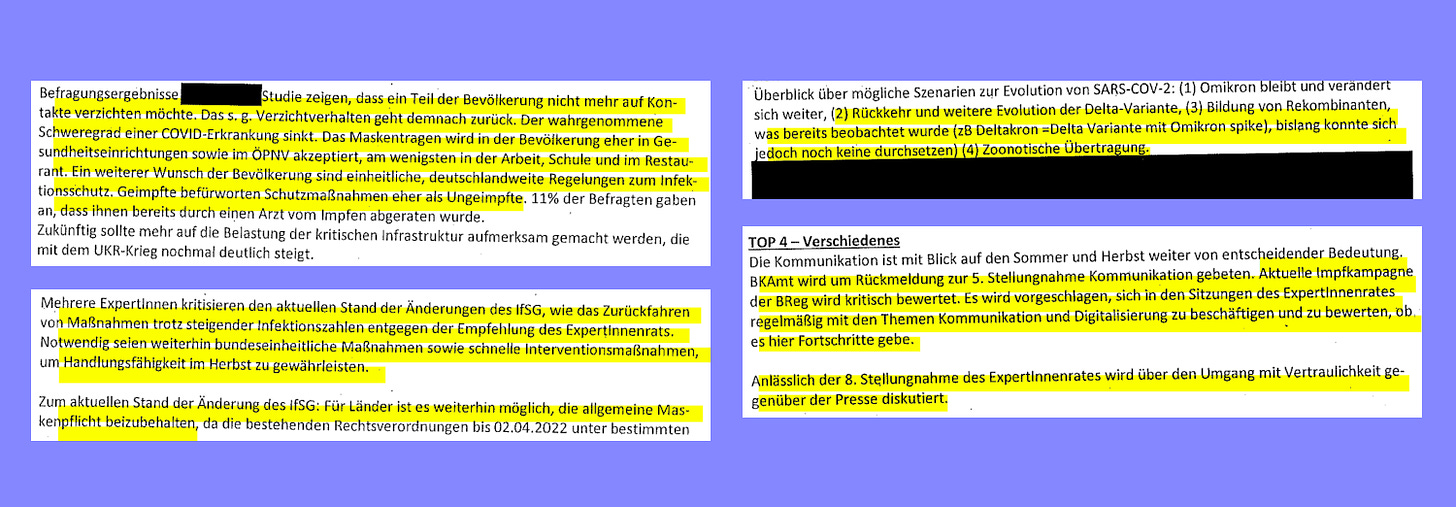
The 14th session noted a decline in “compliance” with regard to Corona measures:
“Survey results from the [—]-study show that part of the population no longer wants to forgo contacts. Accordingly, the so-called renunciation behavior is declining. The perceived severity of a COVID condition is decreasing. Wearing masks is more likely to be accepted by the population in healthcare facilities and in public transport, and least likely at work, school and in restaurants. Another wish of the population is for uniform, Germany-wide regulations on infection protection. Vaccinated people are more likely to support protective measures than unvaccinated people.
“Several experts criticized the current status of changes to the IfSG, such as scaling back measures despite rising infection rates, contrary to the Expert Council’s recommendation.”
Several members of the Expert Council thus advocated tougher measures than the federal government, with regard to the planned changes of the infection control act (IfSG). Starting from April 2022, the federal states would be able to maintain the mask requirement in so-called “hotspots.” More restrictive measures would only be justified if there was a risk of overloading the healthcare system. However, this approach apparently did not go far enough for the Expert Council:
“Uniform nationwide measures would continue to be necessary, as well as rapid intervention measures to ensure the ability to act in the fall.”
There was speculation about upcoming scenarios: Would Omicron stay? Would Delta come back? Would recombinants like Deltacron eventually dominate, or would there even be a new zoonotic transmission? The property of Omicron to cause broad cross-immunity did not seem to be rudimentarily understood by the expert panel.
The experts were also critical of the federal government’s vaccination campaign. The protocols do not specify what exactly said criticism consisted of. At the end of the meeting, the topic of “dealing with confidentiality vis-à-vis the press” was raised again. Here, too, the protocols do not provide any details.
15th session: March 22, 2022
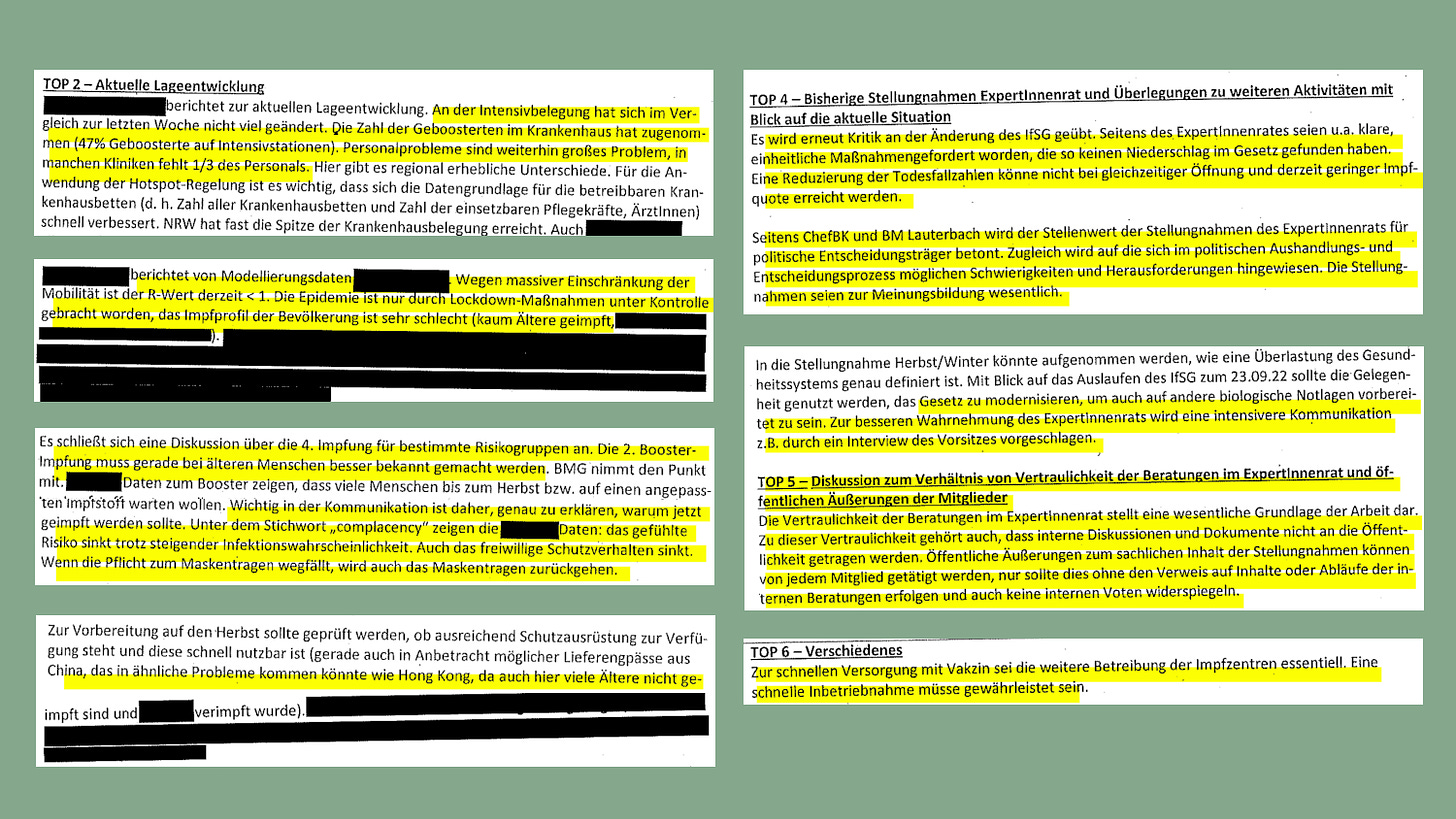
At the 15th session, one expert reported on a country – the name is redacted from the protocols – where only lockdown measures had helped because the population’s vaccination rate was too “poor”:
“The epidemic has been brought under control only by lockdown measures. The vaccination profile of the population is very poor (hardly any elders vaccinated).”
It is clear here that the Expert Council still believed in controlling a seasonal respiratory virus with Lockdowns – and that “vaccination or Lockdown” was again an excellent way to argue pro-vaccination. That this amounted to blackmail seemed to be overlooked by the “experts”.
The next topic was booster vaccination. It was imperative that the second booster be better publicized among older people. Many would still want to wait until the fall or for an adjusted vaccine. In communication, it would therefore be important to “explain exactly why people should be vaccinated now.” But the population’s “complacency” and voluntary protective behavior would continue to decline, despite an increasing likelihood of infection with Omicron:
“If mandatory mask-wearing is eliminated, mask-wearing will also decline.”
What is clear is that the expert council was well aware of how measure-weary the population was. Nevertheless, they were not satisfied with the “relaxations” in the amendments to the new infection control act from March 2022:
“There is renewed criticism of the amendment to the IfSG [infection control act]. On the part of the ExpertInnenrat among other things clear, uniform measures had been demanded, which found so no precipitation in the law. A reduction of the death numbers could not be reached with simultaneous opening and at present small inoculation ratio.”
Accordingly, the new IfSG amendments were not strict enough for the experts. This led to a minor intervention by Wolfgang Schmidt and Karl Lauterbach: they emphasized the importance of the Expert Council for policy makers, but pointed out “possible difficulties (.) in the political negotiation and decision-making process.” The amendments for the new infection control act should also serve to “be prepared for other biological emergencies.”
At the end of the meeting, the importance of confidentiality as a basis for the work of the Expert Council was again emphasized, and all members were urged to do so. Apparently there was a specific reason for the need to reiterate the confidentiality requirement, but the protocols do not specify it any further:
“The confidentiality of the deliberations in the Expert Council represents an essential basis of the work. This confidentiality also includes that internal discussions and documents are not made public. Public statements on the factual content of opinions may be made by any member, only this should be done without reference to the content or procedures of internal deliberations and should not reflect internal votes.”
16th session: March 29, 2022
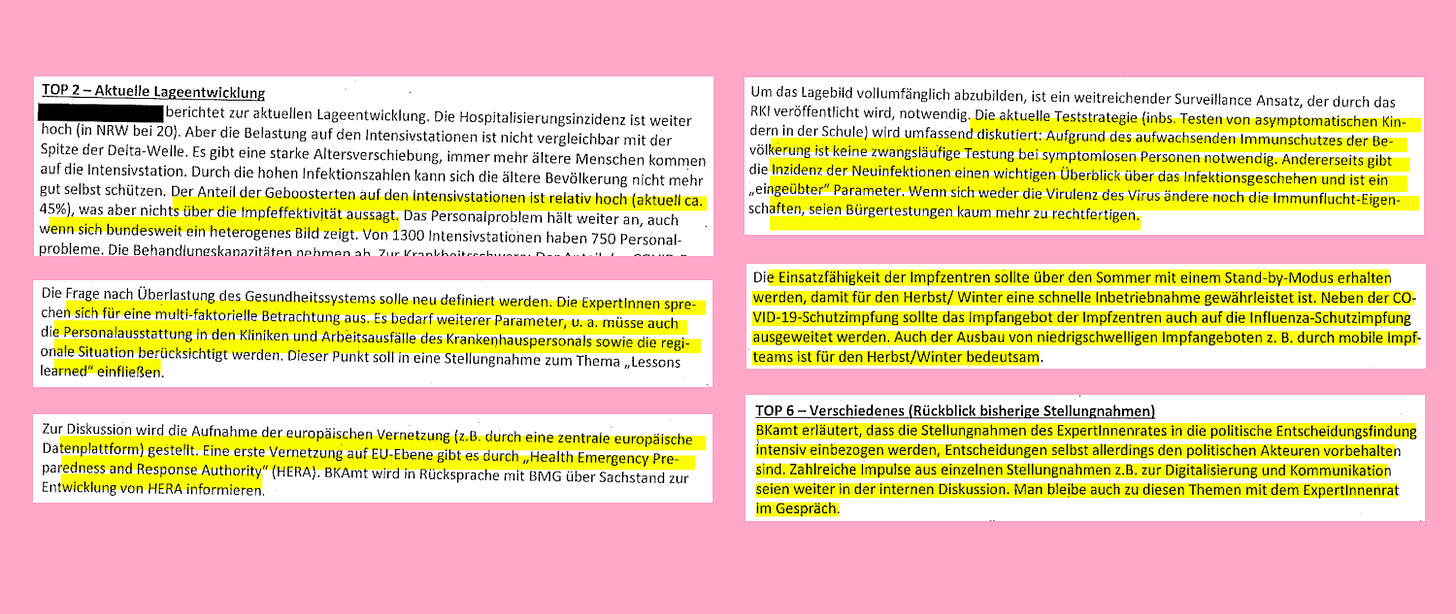
At the 16th session, it was stated that the “proportion of patients treated in intensive care units” was “relatively high” at 45% – but it was immediately added that this “says nothing about the effectiveness of vaccination”.
A European network in the form of a central European data platform was discussed. A first approach already existed through HERA (Health Emergency Preparedness and Response). The Chancellor’s Office announced that it would provide information on the status of the program’s development.
Furthermore, the testing system in schools was addressed:
“The current testing strategy (in particular, testing of asymptomatic children in school) is widely discussed; due to the emerging immune protection of the population, no compulsory testing of asymptomatic individuals is necessary. On the other hand, the incidence of new infections provides an important overview of infection incidence and is a “rehearsed” parameter. If neither the virulence of the virus changed nor the immune escape properties, citizen testing could hardly be justified anymore.”
The argument was not about the best interests of the child, but about “incidences as an important overview of infection events,” which the experts apparently were reluctant to part with because they were a “rehearsed parameter.” In other words, the children would already have been accustomed to it anyway. But the tests could simply no longer be justified. The fact that in regard to children, the argumentation went by what was “justifiable” in the eyes of the general public, is unsettling.
The protocols quoted a representative of the Federal Chancellery, highlighting that
“the opinions of the Expert Council are intensively included into the political decision making, decisions themselves however the political actors are reserved. Numerous impulses from individual statements, e.g. on digitization and communication, are still being discussed internally. We will remain in discussion with the Expert Council on these topics as well.”
At this point, interpersonal friction is clearly noticeable, because the Chancellor’s Office apparently perceived the recommendations of the Council of Experts as too clear a directive for political action.
17th session: April 05, 2022
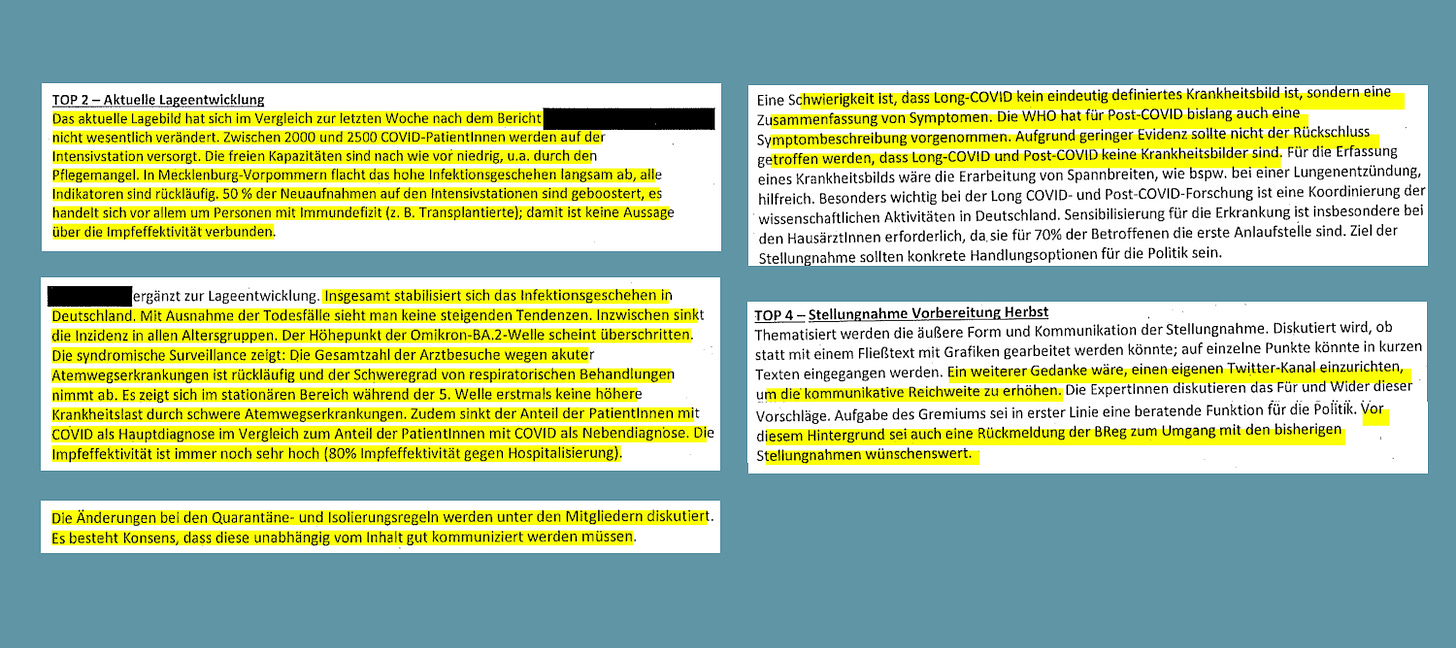
The 17th session was two days before the vote on general vaccination obligation (07 April 2022) in the Bundestag, the German parliament. Remarkably, the descriptions of the “general infectious situation” at that time were completely counter-indicative for the justification of a general vaccination obligation, but the upcoming vote in the Bundestag was not mentioned with a single word in the protocol.
Meanwhile, it was admitted that 50% of new admissions to intensive care units were now boostered. It was quickly added, however, that these were mainly immunodeficient individuals, so no statement about vaccine effectiveness was associated with this figure. Of course not.
It was stated that “incidences” in Germany were stabilizing and decreasing in all age groups. The peak of the Omicron wave had passed, the total number of physician visits for acute respiratory diseases was declining, and the severity of respiratory treatments was decreasing.
What the experts were describing here was the very natural waning of a seasonal cold wave, including the admission that severe courses were also present in boostered patients, as these now accounted for 50% of intensive care cases. So why, if the experts knew all this, did they not give politicians a hint that mandatory vaccination was unnecessary? Had they already become so ideological about mandatory vaccination, that they were unable to rethink their proposal?
Last but not least, the experts wanted “feedback from the federal government on how to deal with the comments made so far.” Apparently, no such feedback had been given; the experts seemed to feel “left out”. Participants in the Expert Council, who had already advised the previous government of Angela Merkel, had probably become accustomed to the good feeling that their assessments were sacrosanct, and politicians would follow them without reservation anyways.
18th session: April 19, 2022

The 18th session was the first one after the failed vote on universal vaccination in the German parliament, the Bundestag, on April 07, 2022. However, the protocols did not mention the outcome of the vote. A conspicuous silence for the fact that the topic was extensively discussed in the Expert Council the weeks before.
It was stated that clinical numbers continued to decline. From a current Lancet article it emerged, however, that excess mortality in Germany was about twice as high as assumed. Quickly, it was added that in other countries, excess mortality would still be significantly higher. The reasons for the high excess mortality were now discussed, but the protocol gives no further information on what possible causes the experts suggested.
It was underlined that a “compliance behavior” of the population remained important and should be continued at an appropriate point. The question arises: Compliance of the population for what? If all parameters were declining and the clinical situation had calmed down according to the season – what is the point of “compliance”? Is it possible that the desire to dictate to others how they should live, had taken on a life of its own among the “experts”?
19th session: April 26, 2022
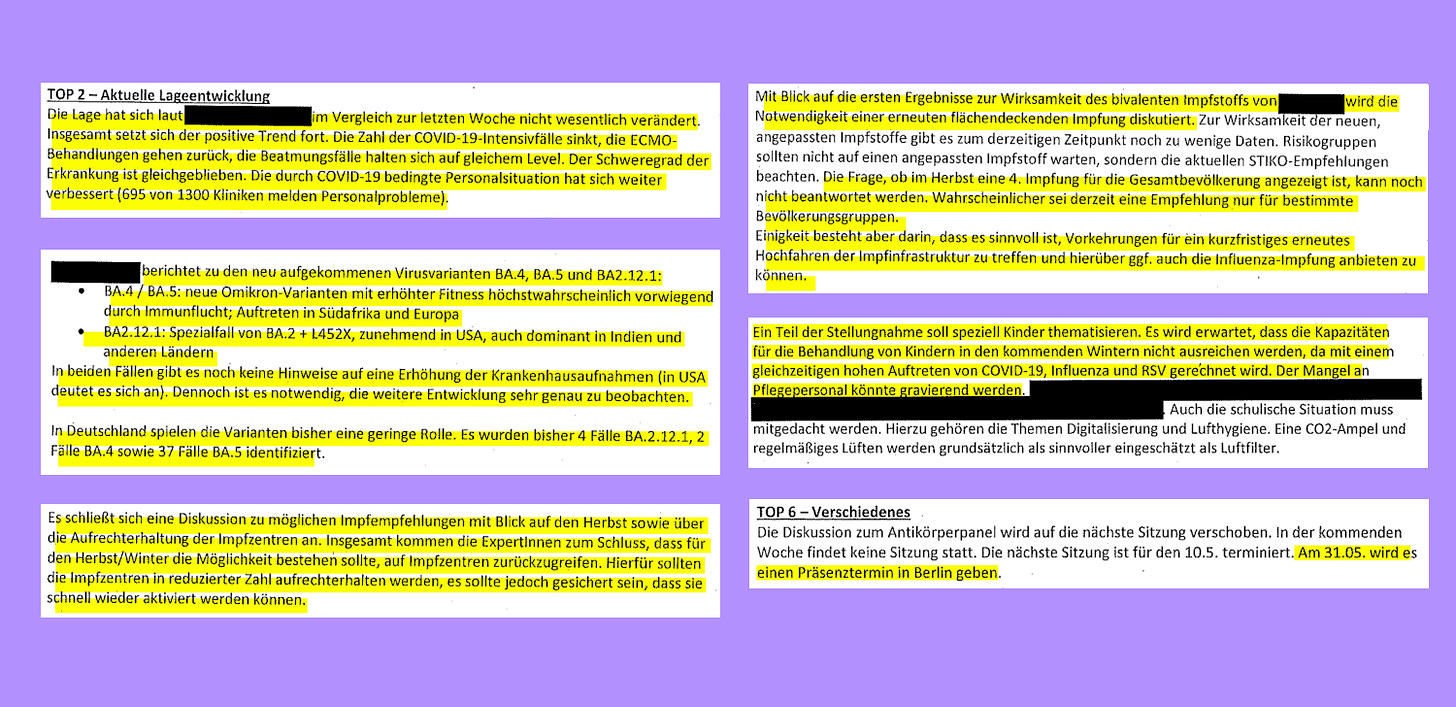
In the 19th session, a continuation of the “positive trend” in infection incidences was recognized. One expert presented “new variants” from the USA, South Africa and India. Although there was no indications of an increase in hospitals admissions, and in Germany the new variants have hardly played a role so far, it was stated that it was nevertheless important to “observe the further development very closely.”
It was warned that clinical care for children might become more difficult to provide in fall, as many influenza and RSV cases were expected in addition to Corona. That the expected high burden of illness in children might have been related to immune deficiencies caused by Lockdowns, 2G measures and school closures, did not occur to the experts. At the end of the session, the first face-to-face meeting at the Chancellor’s Office was announced for May 31.
20th session: May 10, 2022
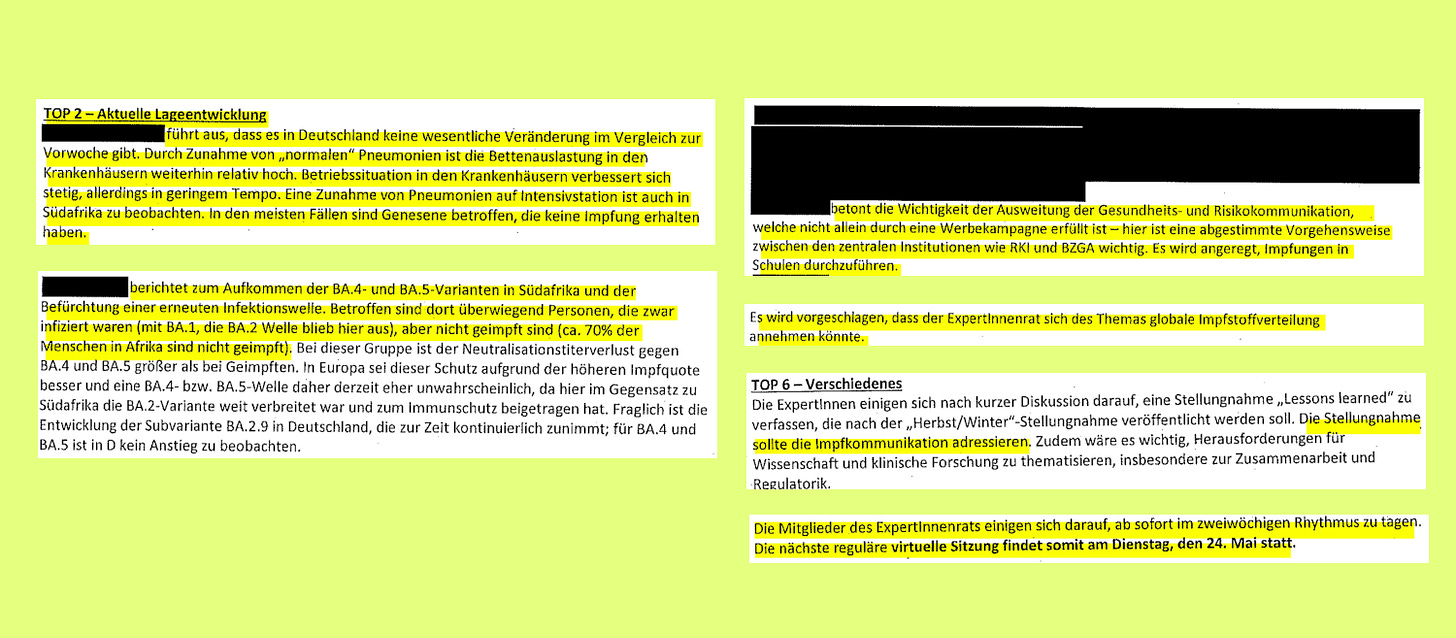
In the 20th meeting, in the “current situation report” there was no major change. An expert reported again on new variants in South Africa. Mainly “recovered unvaccinated people” would be affected. It becomes clear that the expert council was slowly running out of topics with regard to Corona in Germany, as now far-away places where any infectious event could still be detected were regularly thematized.
“[Another expert] stresses the importance of expanding health and risk communication, which is not fulfilled by an advertising campaign alone. Here, a coordinated approach between central institutions such as the RKI and BZGA is important. It is suggested to carry out vaccinations in schools.”
It remains incomprehensible why, without the slightest risk situation by Corona for children, the expert council continued to recommend child vaccination programs in schools.
“The suggestion is made that the Expert Council could address the issue of global vaccine distribution.”
Could the sudden boost of altruism possibly be related to the expiring vaccine doses? At the end of the meeting, it was decided that the Expert Council should meet only biweekly from now on.
21st session: May 24, 2022
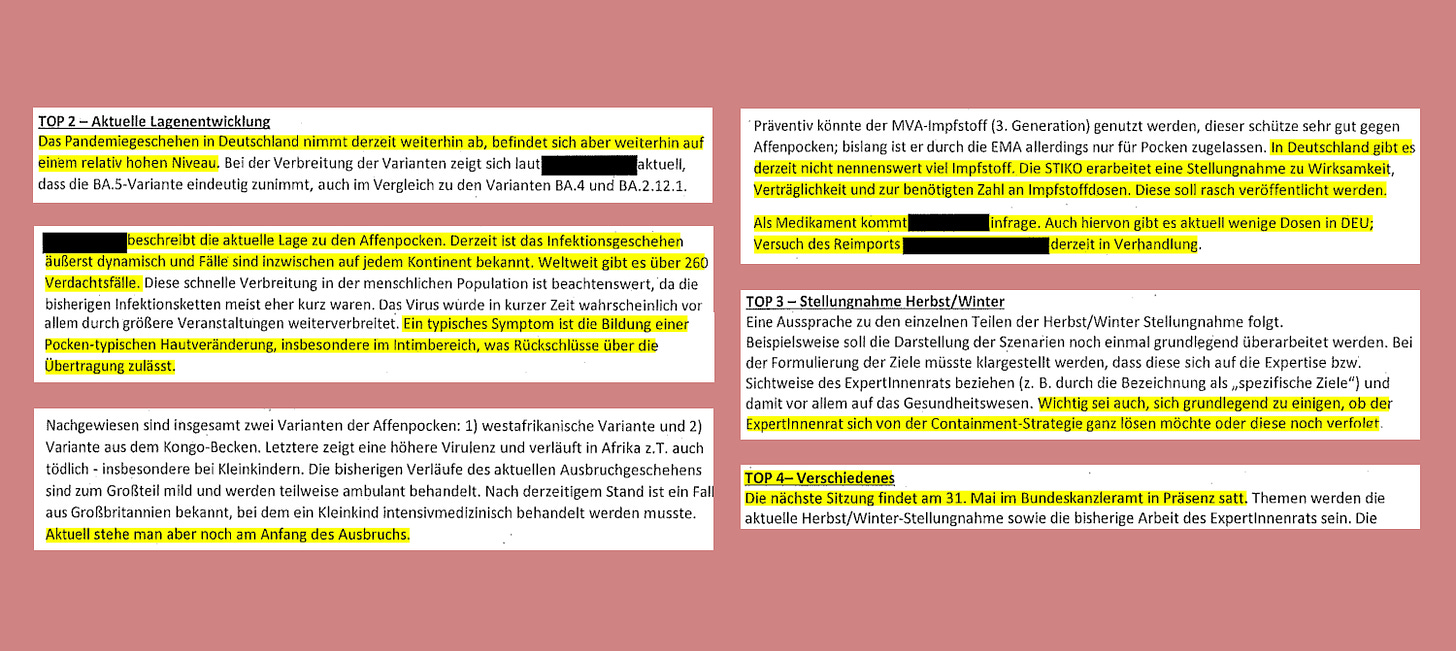
In the 21st session, it was stated that number continued to decline but were “still at a relatively high level.” The last disclaimer was, of course, necessary.
In the absence of corona issues in Germany, which were the actual subject matter of the Expert Council, almost the entire session was now devoted almost exclusively to monkeypox. One expert
“described the current situation regarding monkeypox. He said that the incidence of infection was extremely dynamic: so far, there have been 260 suspected cases ‘on every continent.’ This rapid spread in the human population is ‘remarkable’ “.
One inevitably asks: 260 suspected cases worldwide – what exactly was “remarkable” about that? One would be “still at the very beginning of the outbreak”. In Germany, there would be only little vaccine and medication in stock, therefore an attempt to reimport was “currently under negotiation”. Already at a time when Germany did not have the slightest problem with monkeypox, medicine and vaccine procurement was already undertaken. Has the big monkeypox outbreak 2022 in Germany has ever been heard of again? Is this possibly quite an apt metaphor for the realism of the Corona Expert Council in general?
A remarkable statement followed:
“It would also be important to reach a fundamental agreement on whether the Expert Council would like to move away from the containment strategy altogether or still pursue it.“
The so-called containment strategy was first introduced into the German discourse within the COVID-19 Task Force of the Federal Ministry of the Interior in March 2020 by two China supporters. Prior to that, the RKI and all existing pandemic guidelines recommended herd immunity as an immunization strategy. The concept of herd immunity was denounced as “unethical” by the CCP-friendly government advisors, suggesting that COVID-19 could even be made to disappear altogether with containment measures à la China, if only they were strict enough. One of the two Mao fans among the BMI advisors, Otto Kölbl, had publicly stated several times that before the BMI’s COVID-19 Task Force, many experts in Germany had still been convinced of the herd immunity strategy – according to Kölbl, Christian Drosten was among them – but that the vehement, concerted rejection of this concept within the framework of the COVID-19 Task Force had finally brought them into line.
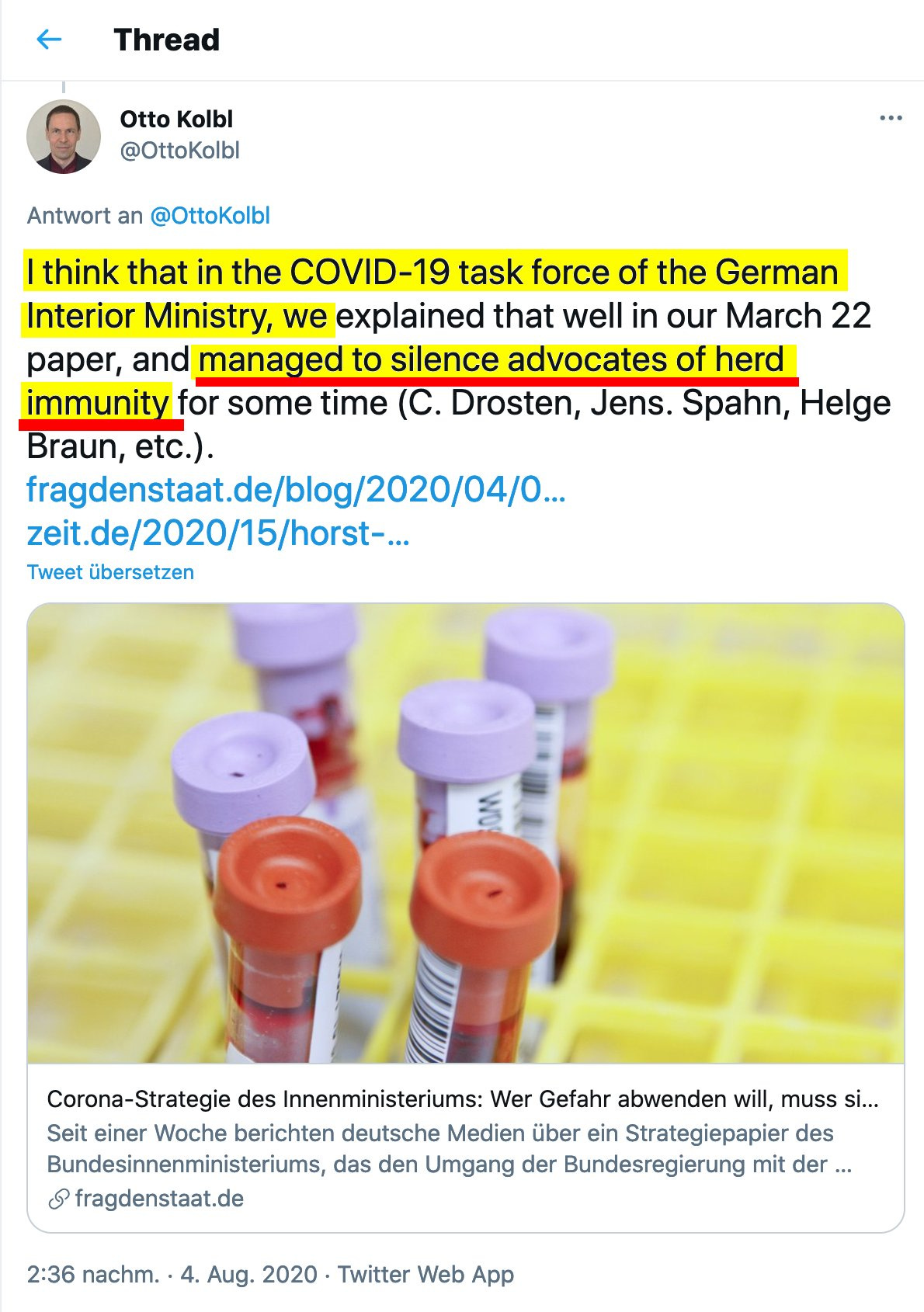
The containment strategy has meanwhile failed even in the mother country China:
Xi Jinping had declared the “Zero-Covid”-strategy in China to be over after the last lockdown in Shanghai, where people threw themselves out of skyscrapers in desperation because of hunger.
Germany’s Corona policy under Merkel, and in continuation under Scholz, was oriented in its basic features to the containment concept, but for true fans of Corona measures, German measures never went far enough. Two council members had directly supported the China-inspired “NoCovid”-campaign, several other members had openly sympathized with it. When the Expert Council put up for discussion whether the containment concept should now be “completely” abandoned, or whether it would “still be pursued” at all, this is tantamount to an admission of failure.
This is how pseudo-scientific ideologies die: Quietly, secretly and in print, in back rooms, without even the slightest lesson being learned from own failures.
22nd session: May 31, 2022
Face-to-face meeting in the Chancellor’s Office
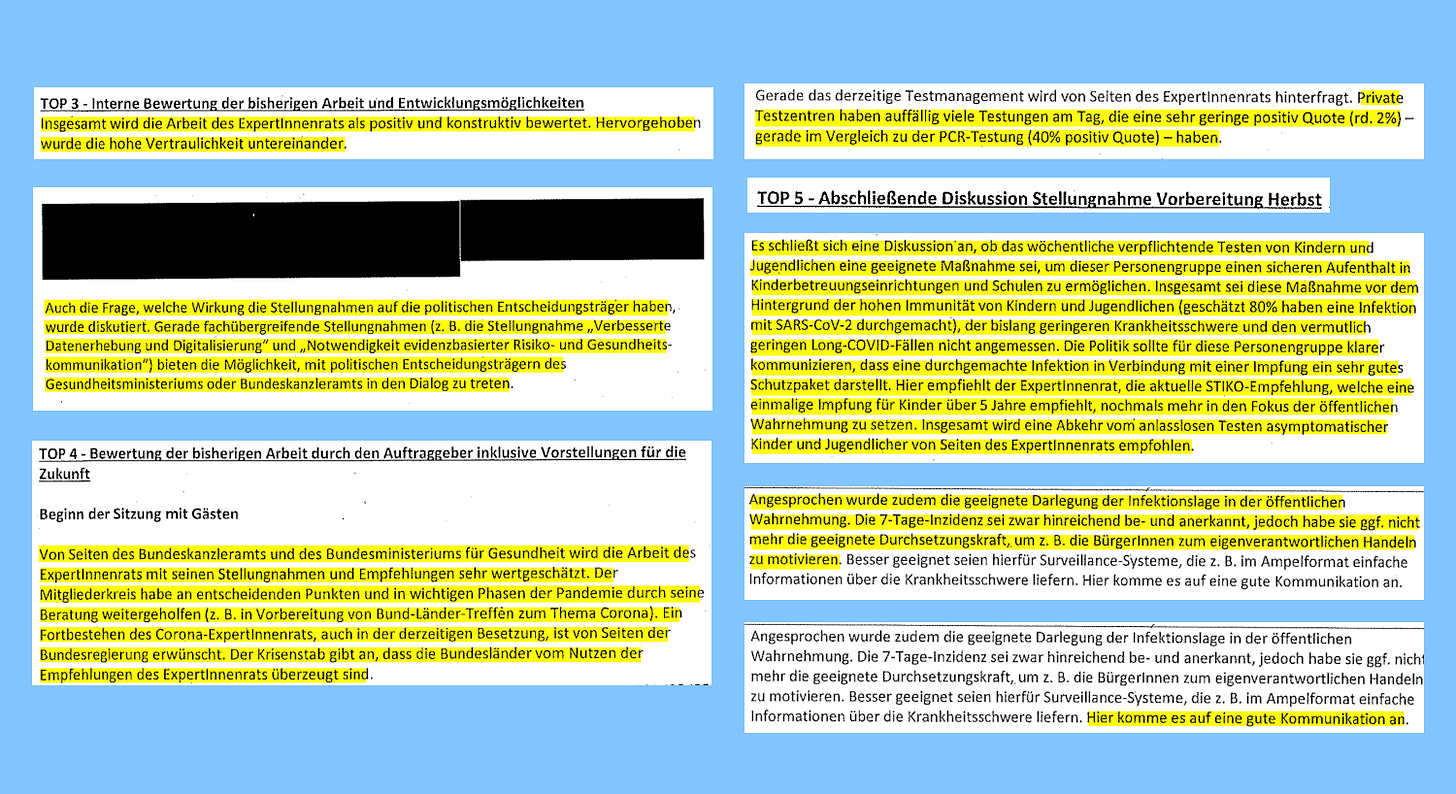
The 22nd meeting was the Panel’s first face-to-face meeting and was held in the International Conference Room of the Chancellor’s Office. Before the meeting began, the panel’s work to date was evaluated internally:
“Overall, the work of the Expert Council was assessed as positive and constructive. The high level of confidentiality among the members was emphasized.”
The question of what effect the opinions have on political decision-makers was also discussed. At the beginning of the meeting, the Chancellor’s Office, evaluated the group’s work and expressed full praise:
On the part of the Chancellor’s Office and the Federal Ministry of Health, the work of the Expert Internal Council with its opinions and recommendations is highly valued. The members of the council have helped at crucial points and in important phases of the pandemic through their advice (e.g. in the preparation of federal-state meetings on the subject of Corona). The continuation of the Corona Expert Council, also in its current composition, is desired by the federal government. The crisis team states that the federal states are convinced of the usefulness of the Expert Council’s recommendations.
Unqualified praise for the Expert Council – and finally one “breakthrough”:
“Overall, a move away from the asymptomatic testing of asymptomatic children and adolescents is recommended by the Expert Council.”
The recommendation came way too late: Schools had already stopped testing across the board since the beginning of april. The recommendation was related to a departure from “incidences” as an indicator, since it was no longer able to “motivate the population to act on their own responsibility”:
“Also addressed was the appropriate presentation of the infection situation to the public. Although the 7-day incidence is sufficiently recognized and acknowledged, it may no longer have the appropriate enforcement power to motivate citizens to act on their own responsibility, for example. Surveillance systems, which provide simple information about the severity of the disease, for example in traffic light format, are better suited for this purpose. What matters here, (.) is good communication.”
Indeed: By the end of May 2022, “incidences” hardly impressed anyone anymore. The term “self-responsible action” was obviously used by the authors as a cipher for “voluntary compliance of citizens with the Corona measures.”
23rd session: June 14, 2022
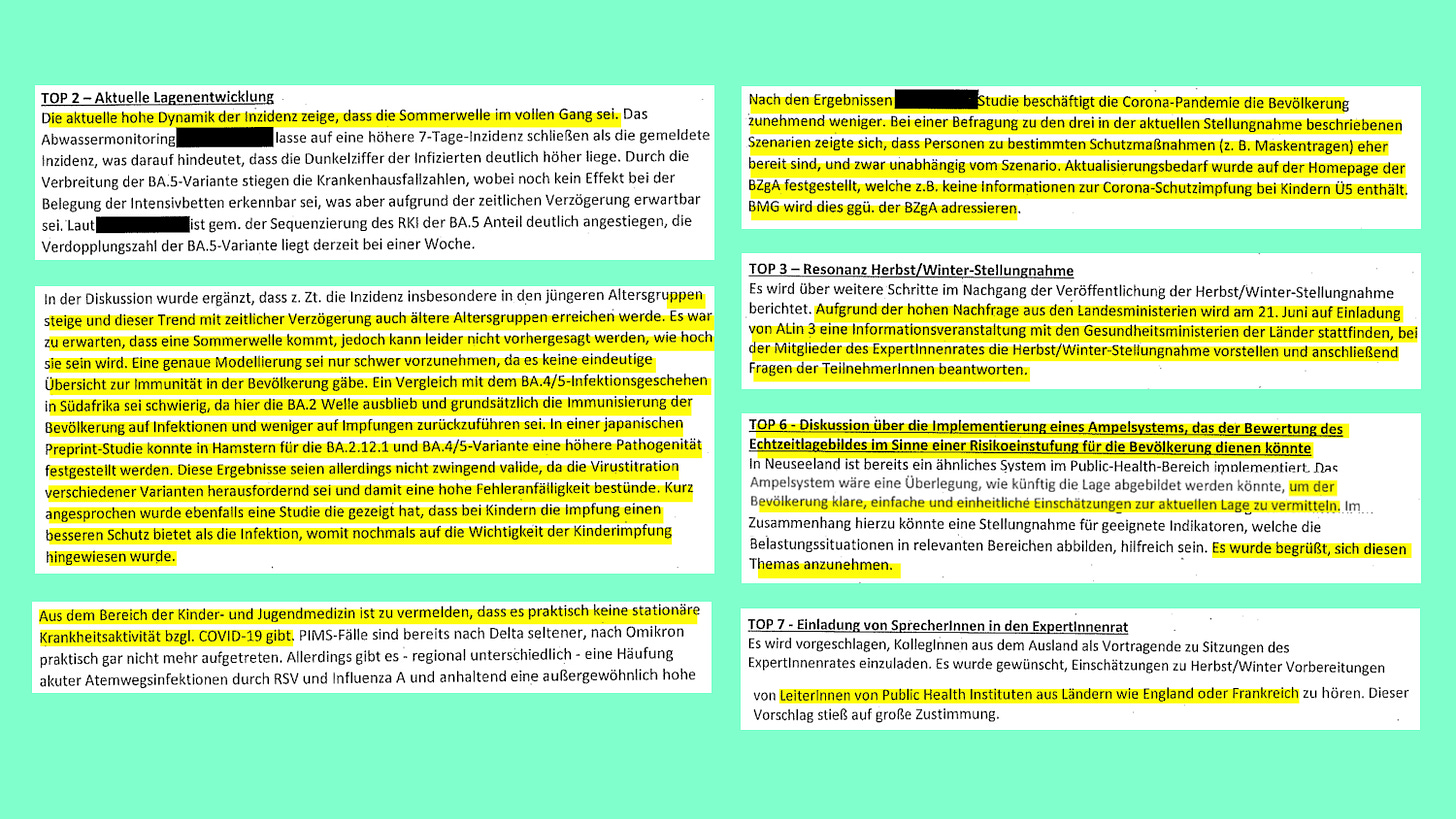
In the 23rd meeting, it was noted “that the summer wave was in full swing”:
“It would be difficult to compare with the BA.4/5 infectious event in South Africa, because here the BA.2 wave was absent and basically the immunization of the population was due to infections rather than vaccination.”
The question arises as to why there was one Omicron wave “missing” in South Africa, despite low vaccination rates. Why didn’t the experts ask this question?
“Also briefly addressed was a study that showed that in children, vaccination provides better protection than infection, again highlighting the importance of childhood vaccination.”
The same report, just one paragraph further on, stated:
“From the field of pediatrics and adolescent medicine, it is to be avoided that there is practically no stationary disease activity regarding COVID-19. PIMS cases have already become rare after Delta, and virtually nonexistent after Omicron.”
How is it possible to state that there was no longer a steady state of infections in children, but at the same time stress the importance of childhood vaccination? Was it really still assumed at that time that the vaccine was free of any side effects and therefore had a positive cost-benefit ratio for children?
In this session, the experts once again devoted extensive attention to the topic of “compliance”:
“According to the results of the [–] study, the Corona pandemic is increasingly less on the minds of the population. A survey of the three scenarios described in the current statement showed that people are more willing to take certain protective measures (e.g., wearing masks), regardless of the scenario.”
One wonders, if the Expert Council was so aware that the population was “increasingly less interested” in the Corona pandemic – why it could not simply be left alone. But the opposite was the case: for the fall, a “traffic light system” – in a semantic analogy to the current German government, called “traffic light coalition” – was introduced, so that the population could always be informed about the hazard situation. In the state ministries, interest in the advice from the expert council was apparently unabated:
“Due to high demand from state ministries, an information session with state health departments will be held on June 21 at the invitation of ALin3. Members of the Expert Council will present the fall/ winter position statement and then answer questions from participants.”
24th session: June 28, 2022
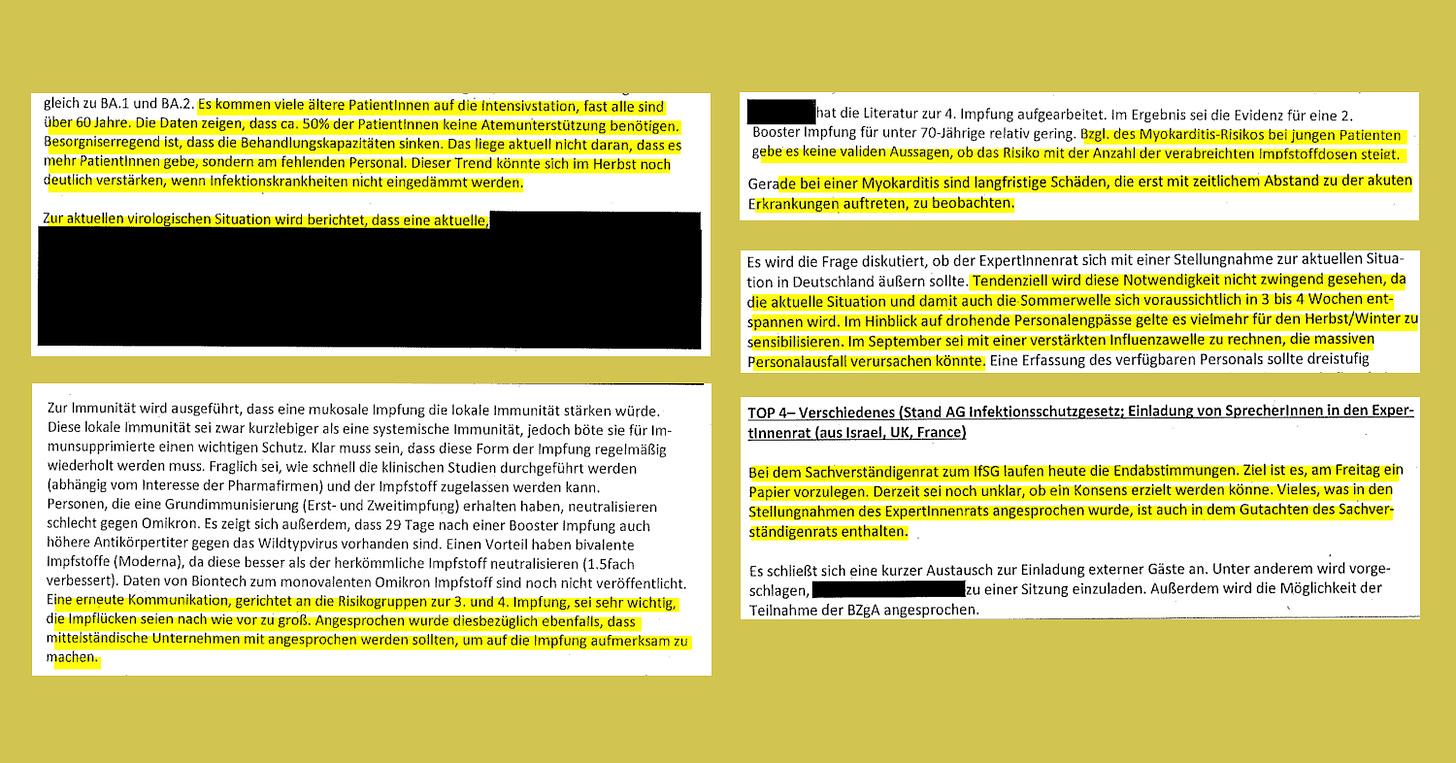
At the 24th session, there were renewed complaints about staffing shortages at clinics. More elderly patients over 60 would be admitted again:
“A renewed communication, directed to the “risk groups to the 3rd and 4th, vaccination, is very important, the vaccination gaps are still too large. In this regard, it was also addressed that medium-sized companies should be addressed to draw attention to the vaccination.”
Extremely explosive statements about the risk of myocarditis for young people followed:
“[–] reviewed the literature on 4th vaccination. The conclusion was that the evidence for a 2nd booster vaccination for people under 70 years of age was relatively low. With regard to the risk of myocarditis in young patients, there are no valid statements as to whether the risk increases with the number of vaccine doses administered. Especially in myocarditis, long-term damage that occurs only with a time lag from the acute disease[s] can be observed.”
Had the population not been told that there were no long-term consequences of vaccination? And in this internal discussion, “damage that occurs only after a time lag from the acute illness” was taken as a given, which was merely “to be observed”? Why was there a different state of knowledge behind closed doors, than that which was communicated to the public? It remains unclear why the Expert Council, despite acknowledging possible long-term damage to young people in the event of vaccine-induced myocarditis, did not advise against childhood vaccination from this moment at the latest, but on the contrary even continued to explicitly recommend it.
25th session: July 12, 2022
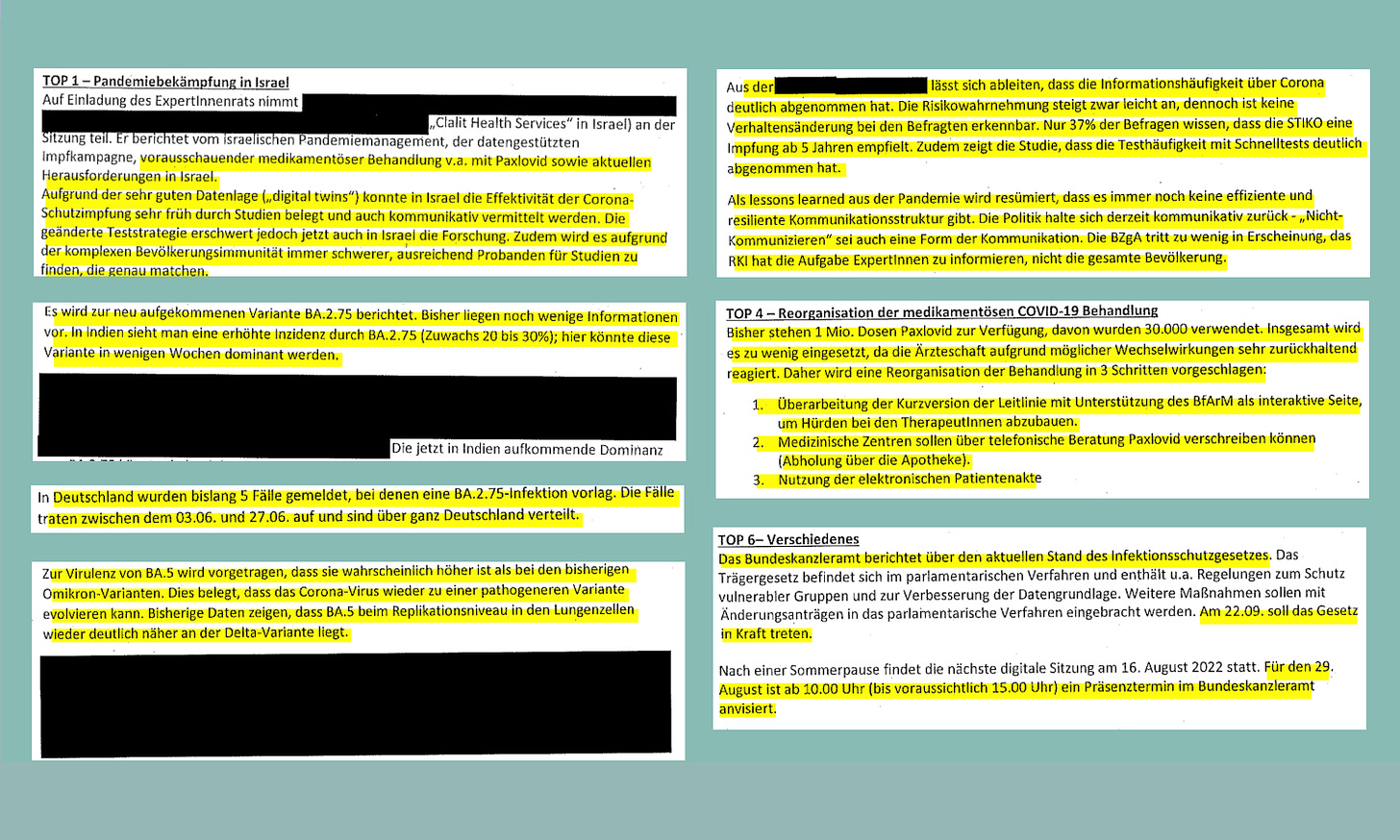
The 25th meeting was attended by a public health expert from Israel. He reported on the experience of the data-driven vaccination campaign in Israel:
“Because of very good data (“digital twins”), the effectiveness of Corona vaccination could be proven very early in Israel through studies (.)”
“Digital twins” means a digital image of a person that contains all relevant data. The technology can be well justified via the “preventive health” selling point – once implemented, it can be extended to any number of areas and forms the basis for a “digital identity.”
“From the [–] it can be deduced that the frequency of information about Corona has decreased significantly. Risk perception is increasing slightly, yet no change in behavior is evident among respondents. Only 37% of respondents know that STIKO recommends vaccination from age 5.”
Was it assumed, that if more than 37% knew about the German Vaccine Commission’s (STIKO) vaccine recommendation starting at age 5, more parents would have their children vaccinated?
“Nevertheless, no change in behavior is apparent among the respondents”
At the time of the 25th session, it was summer, not cold season. Why was it so important to the experts to bring about a behavioural change among the population, even in midsummer? The experts complained that the Scholz government communicated to little:
“As ‘lessons learned’ from the pandemic, it is summed up that there is still no efficient and resilient communication structure. Politicians are currently holding back on communication. “Not” communicating is also a form of communication. The BZgA does not appear enough, the RKI has the task to inform experts, not the whole population.”
If these lines need any commenting at all, it is to ask under which stone the experts have been living, if they really believe that there has not been enough communication about Corona from the government in 2021 / 2022 – and what extra value was suggested when a respiratory virus that only hit in winter, was dealt with in summer.
At the end of the session, the Chancellor’s Office reported on the current status of the new Infection Protection Act, which should come into force on September 22, 2022.
Summary assessment of the document
The declassified protocols of the Corona Expert Council are a key document for understanding the political and social climate in Germany in the winter of 2021/ 2022, when unprecedented restrictions on fundamental civil rights applied to 25% of the population in the form of 2G- (vaccinated/ convalescent people only) or 3G rules (vaccinated/ convalescent/ tested people only), children were forced under masks, occupational bans were issued and countless livelihoods were destroyed. The legal exclusion of the Unvaccinated was accompanied by a continuous media fire of defamation, while the Scholz coalition attempted to push through a bill for general mandatory vaccinations in the Bundestag on April 07, 2022 – against the will of a large part of the population.
The protocols of the Corona Expert Council reveal: The incomprehensible, mindless and rigid-seeming Corona measures in Germany, which were often met with head-shaking abroad, had an ideological basis – and one central element of this was the Corona Expert Council. It recommended mandatory vaccinations, and did not revise that proposal even when the seasonal cold wave was already subsiding, and Omicron dominated, producing widespread herd immunity. In the presence of the German minister of justice, Marco Buschmann, the medical misinformation was spread that vaccination reduced the risk of transmission.
The Expert Council also encouraged state governments to implement more rigorously occupational and entry bans for unvaccinated caregivers, and suggested replacing the discretionary powers of state health departments with uniform federal regulations. Meanwhile, the Council’s focus was not only on protection against infection, but also on Social Engineering goals, like a permanent change in the behavior of the population – and this until summer 2022, when there was not even the slightest medical need for it anymore.
The Expert Council rigorously promoted childhood vaccinations from the age of five, even though the experts were informed about possible long-term damage from vaccine-induced Myocarditis in children and adolescents. Instead of doing the only right thing – to immediately stop vaccinating children – they even further recommended them. Of particular interest here is the fact that Thomas Mertens, the head of the German “Standing Commission on Vaccination” (STIKO), took part in the council. The fact that the STIKO did not immediately suspend its recommendation for childhood vaccination, but on the contrary, even continued to recommend it until the end of may 2023, could possibly also involve legal aspects – such as liability for damages.
Between the lines, tensions between the Expert Council and the Chancellor’s Office can be read: Council members frequently complained that politicians did not sufficiently adhere to their recommendations – while the political representatives pointed out at several instances in the documents that the ultimate political decision-making power lay with the politicians. The protocol reveals the expert’s attempt to undermine democratic decision-making processes via a dictate of scientism.
But the failure of the Corona Expert Council goes hand in hand with the failure of a political staff that was unable to recognize logical inconsistencies and the ideological one-sidedness in the Council’s recommendations. The fact that the Corona Expert Council was not dissolved until April 2023, is just one of numerous scandals surrounding a body that exerted influence on politics from a non-transparent backroom – and whose political and social reappraisal is still in its infancy. The documents at hand offer the decisive key to this.
Christian Haffner, the physician who fought successfully for the release of documents via the Freedom of Information Act, is now calling for the establishment of an independent Enquête Commission concerning the Corona mea:
“The protocols of the Corona Expert Council, on which many Corona measures were based, show that a neutral Enquête Commission to come to terms with the Corona crisis is urgently needed. It is also a matter of avoiding a repetition and protecting the population from political-ideological attacks by the state in the future.”
Source Link: https://www.velazquez.press/p/new-foia-in-germany-the-secret-files
Bitchute: https://www.bitchute.com/channel/YBM3rvf5ydDM/
Telegram: https://t.me/Hopegirl587
EMF Protection Products: www.ftwproject.com
QEG Clean Energy Academy: www.cleanenergyacademy.com
Forbidden Tech Book: www.forbiddentech.website

